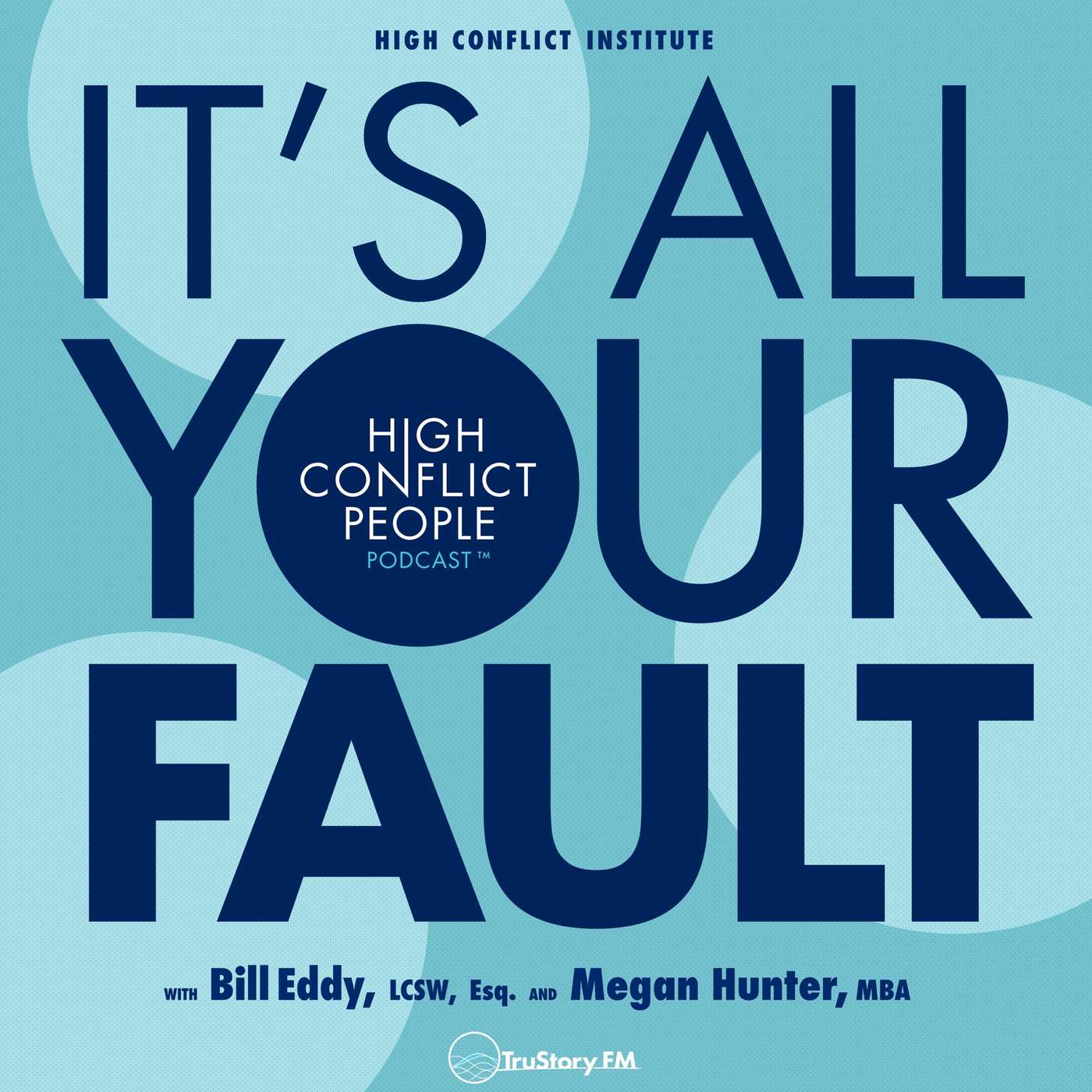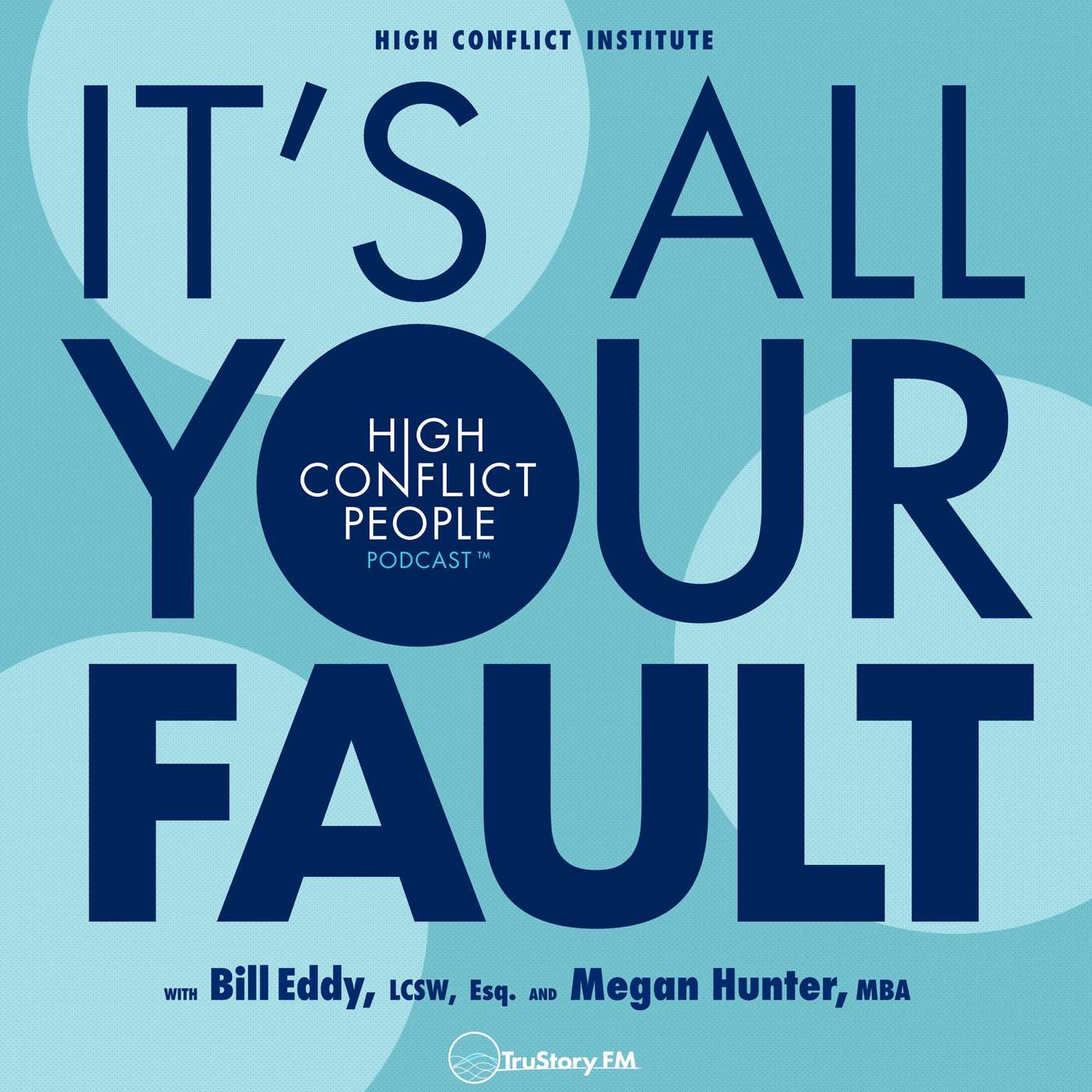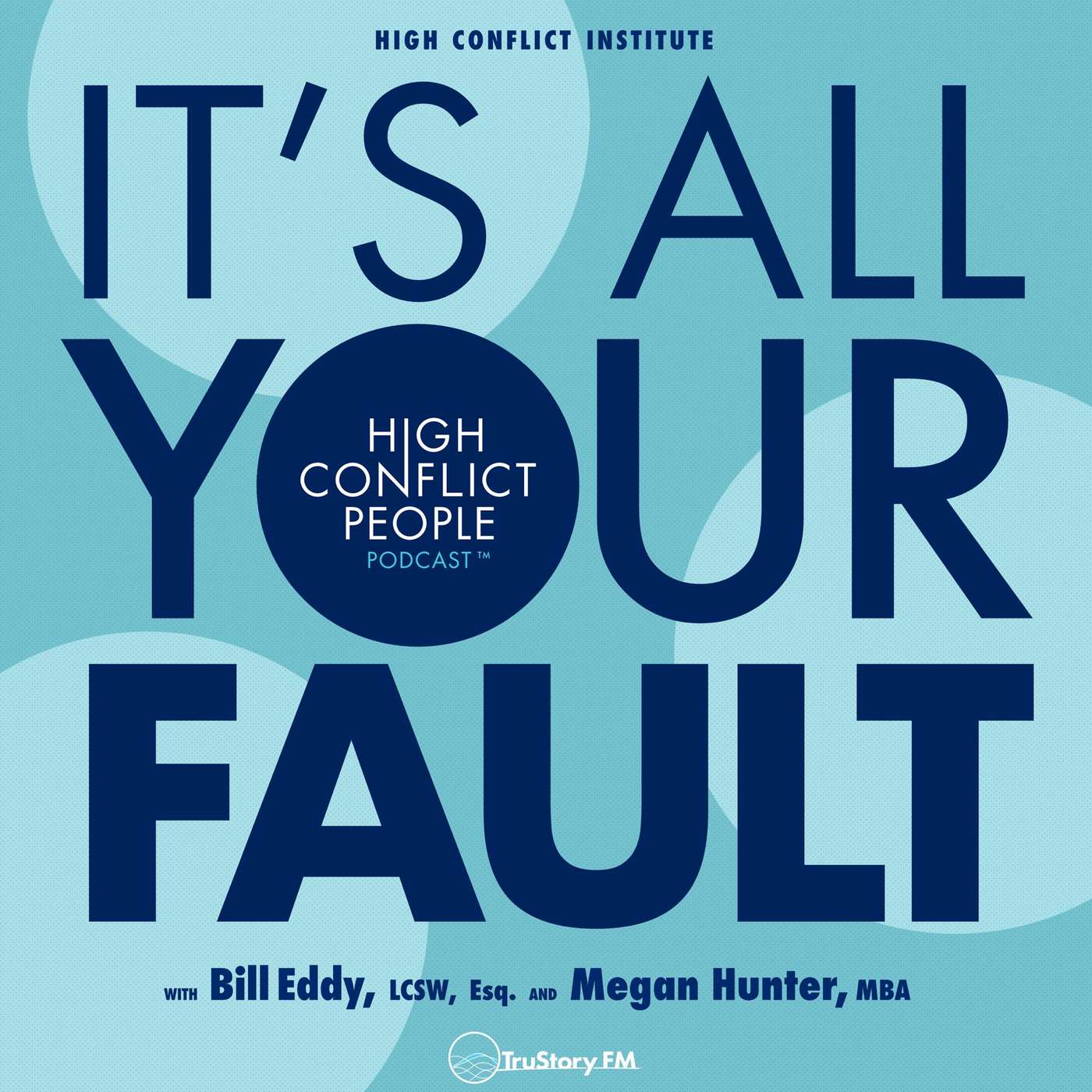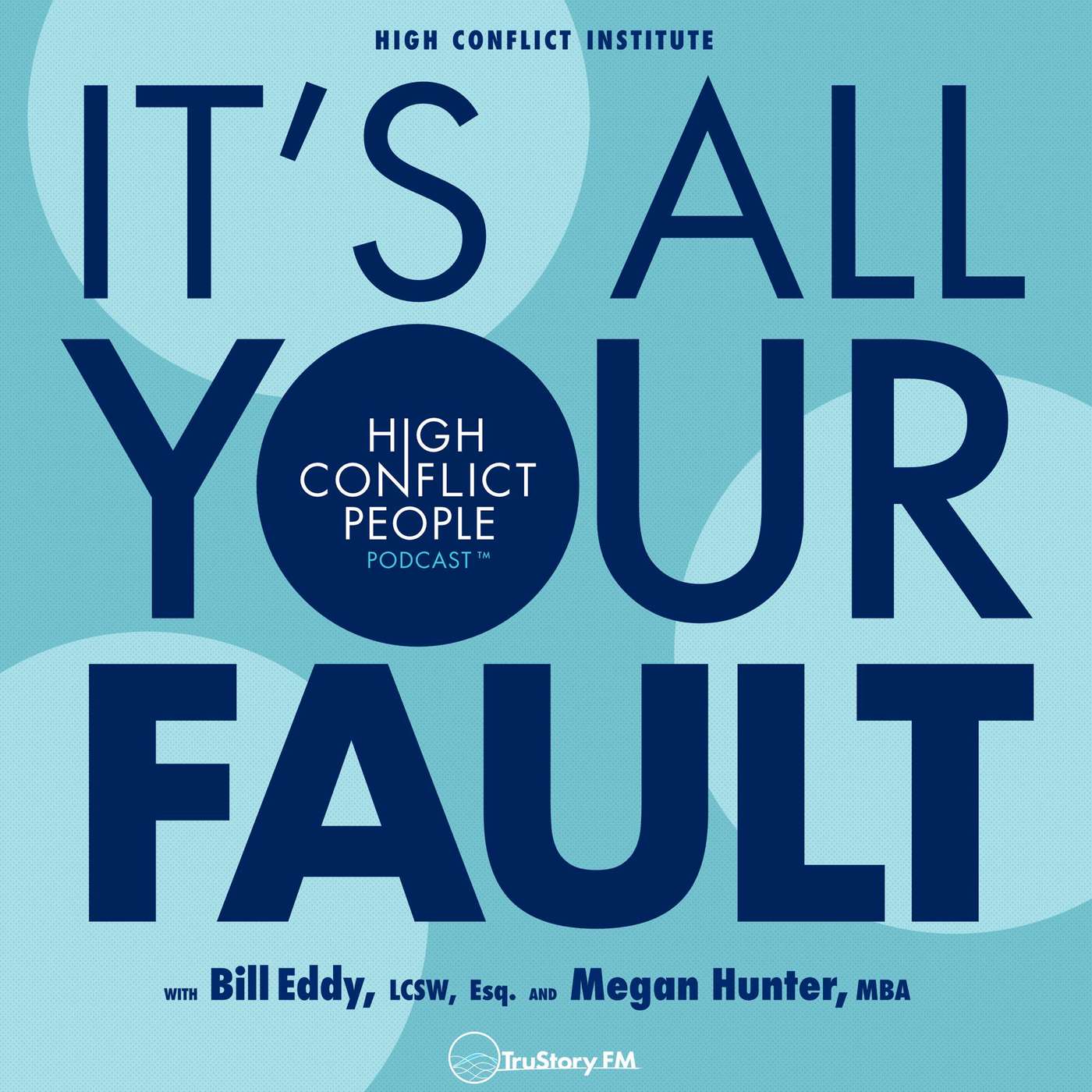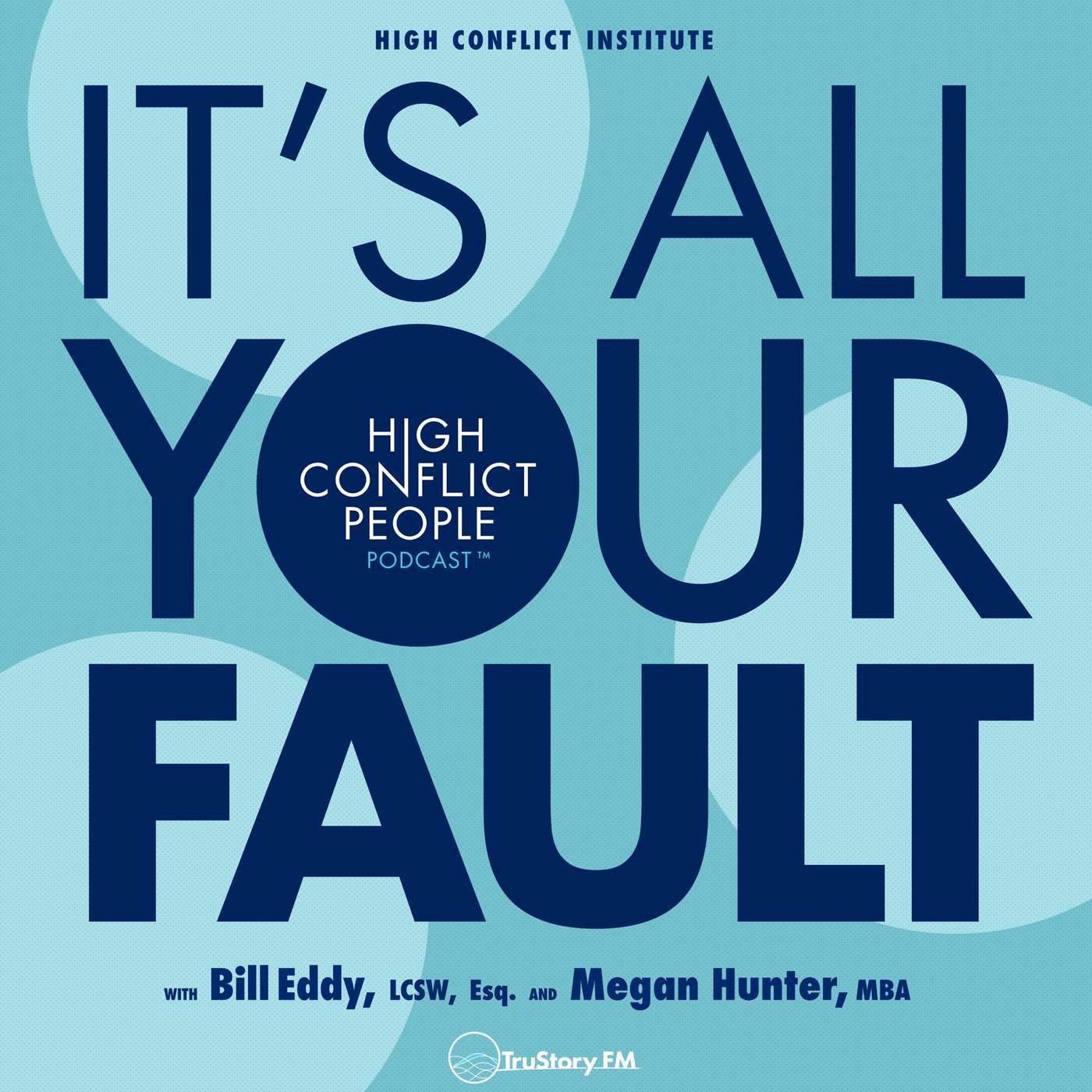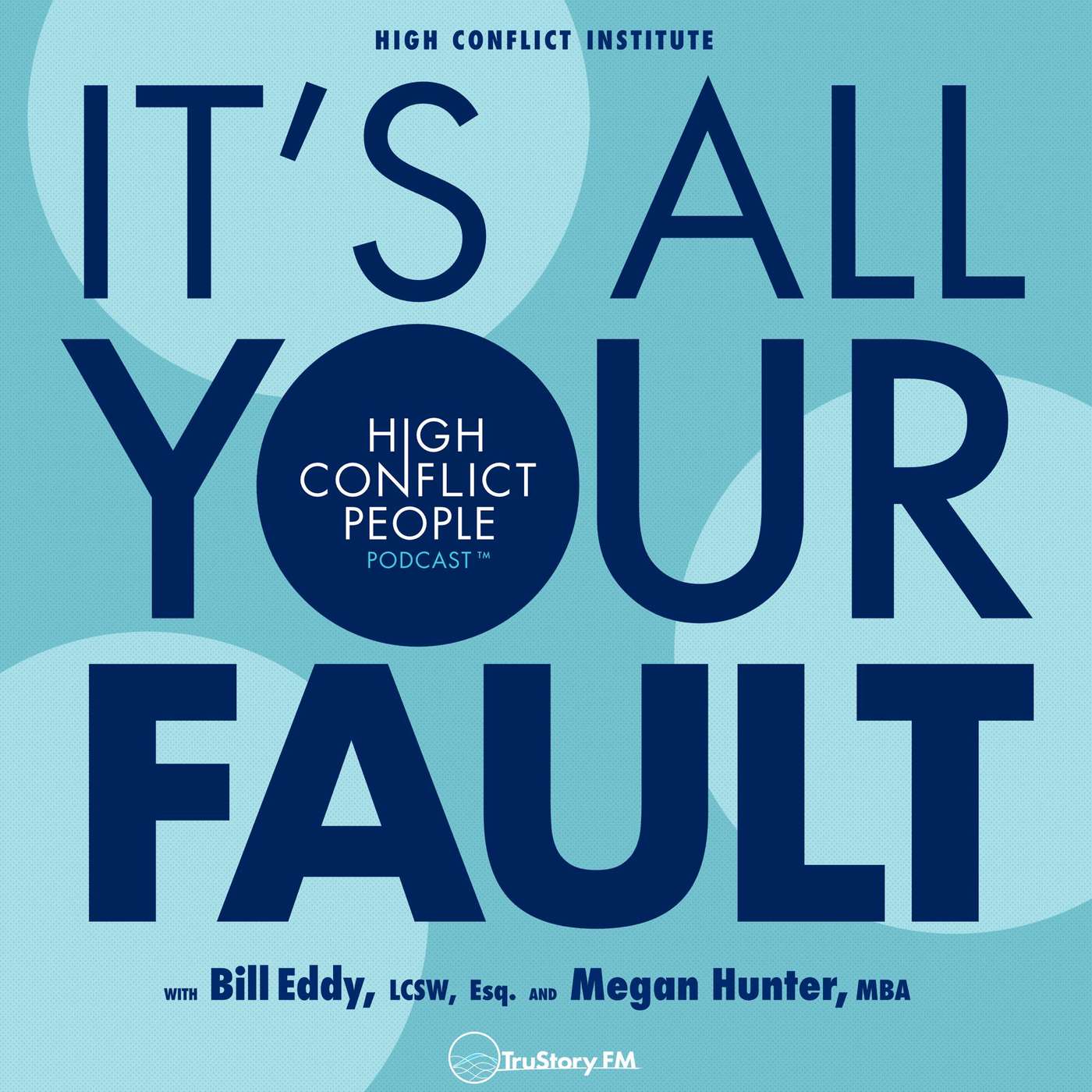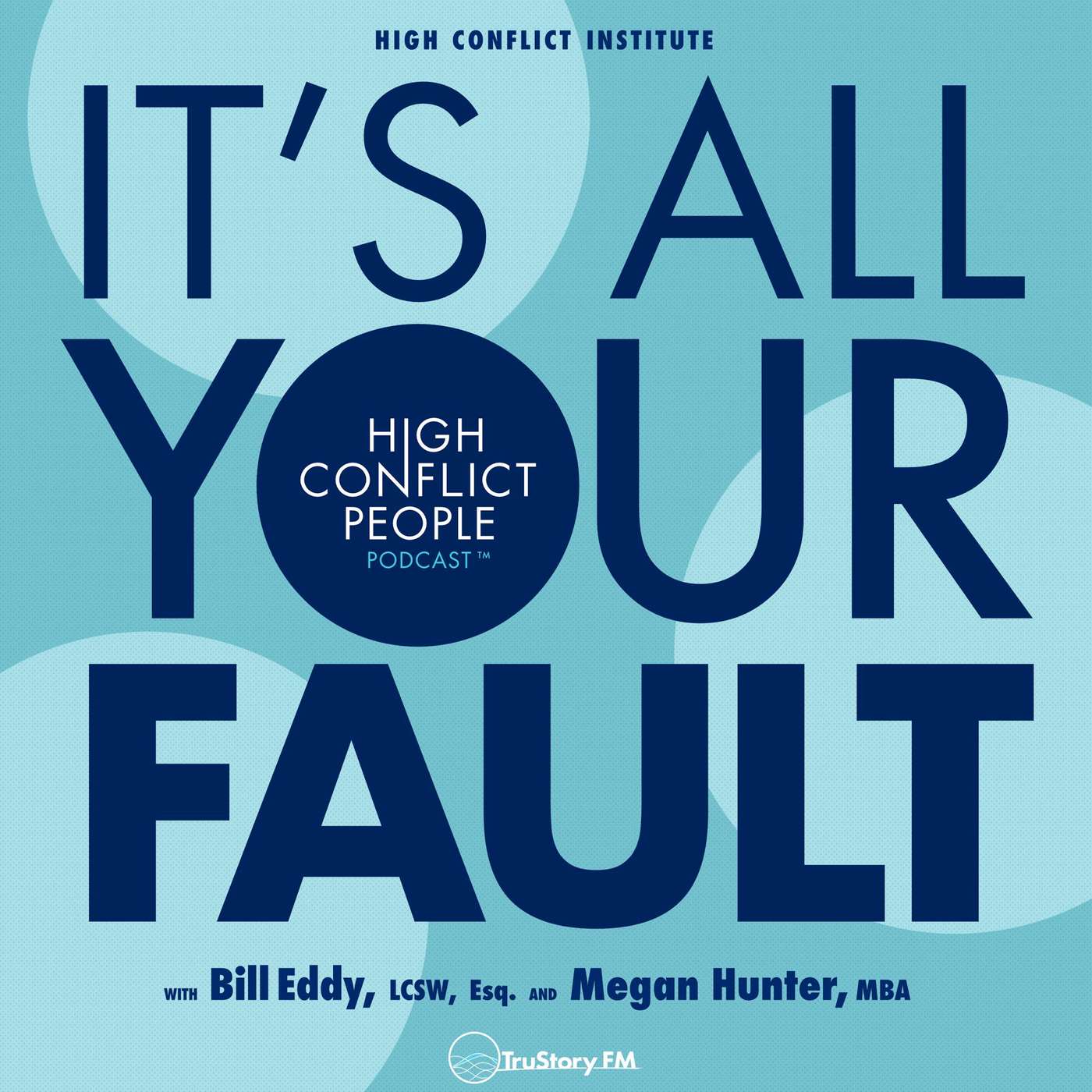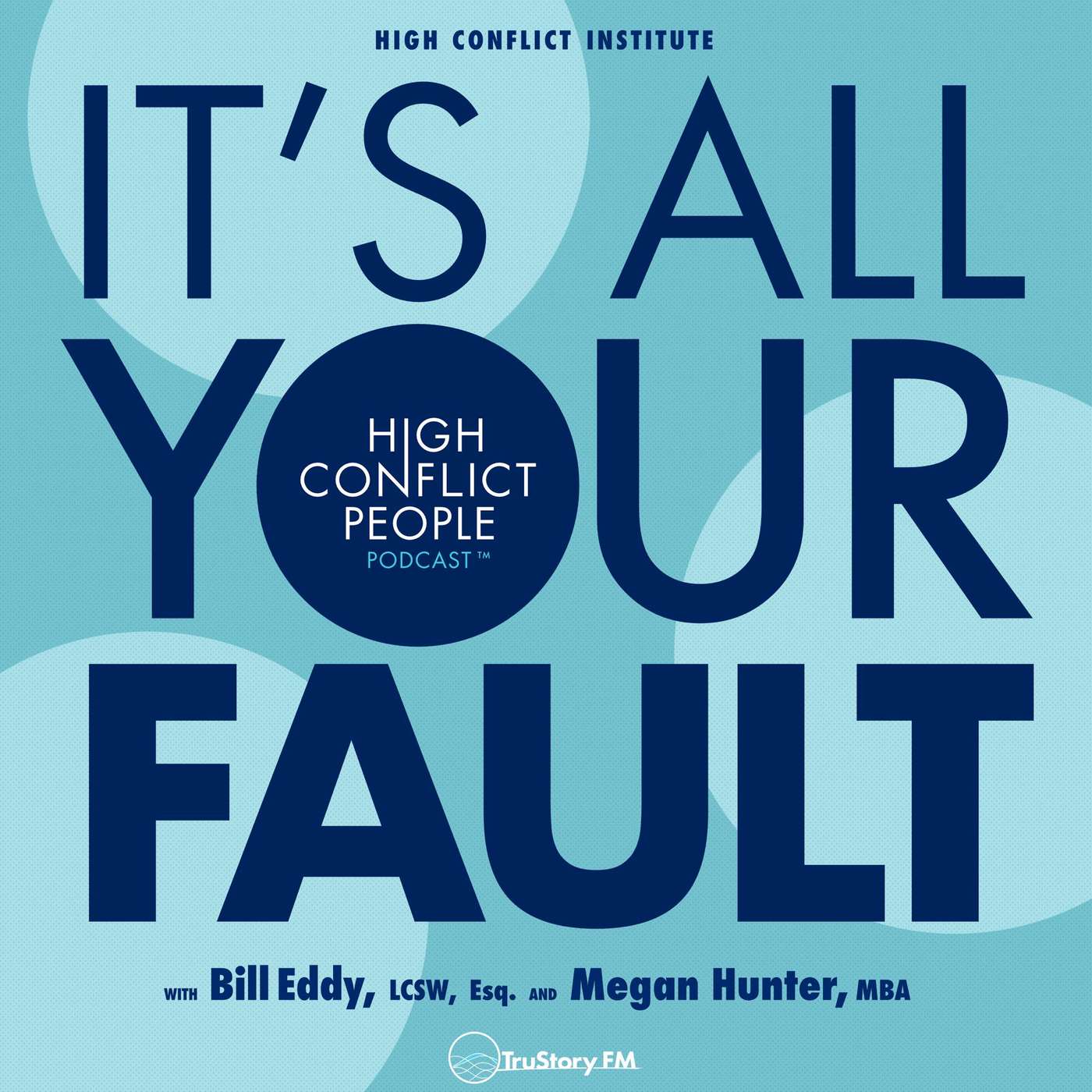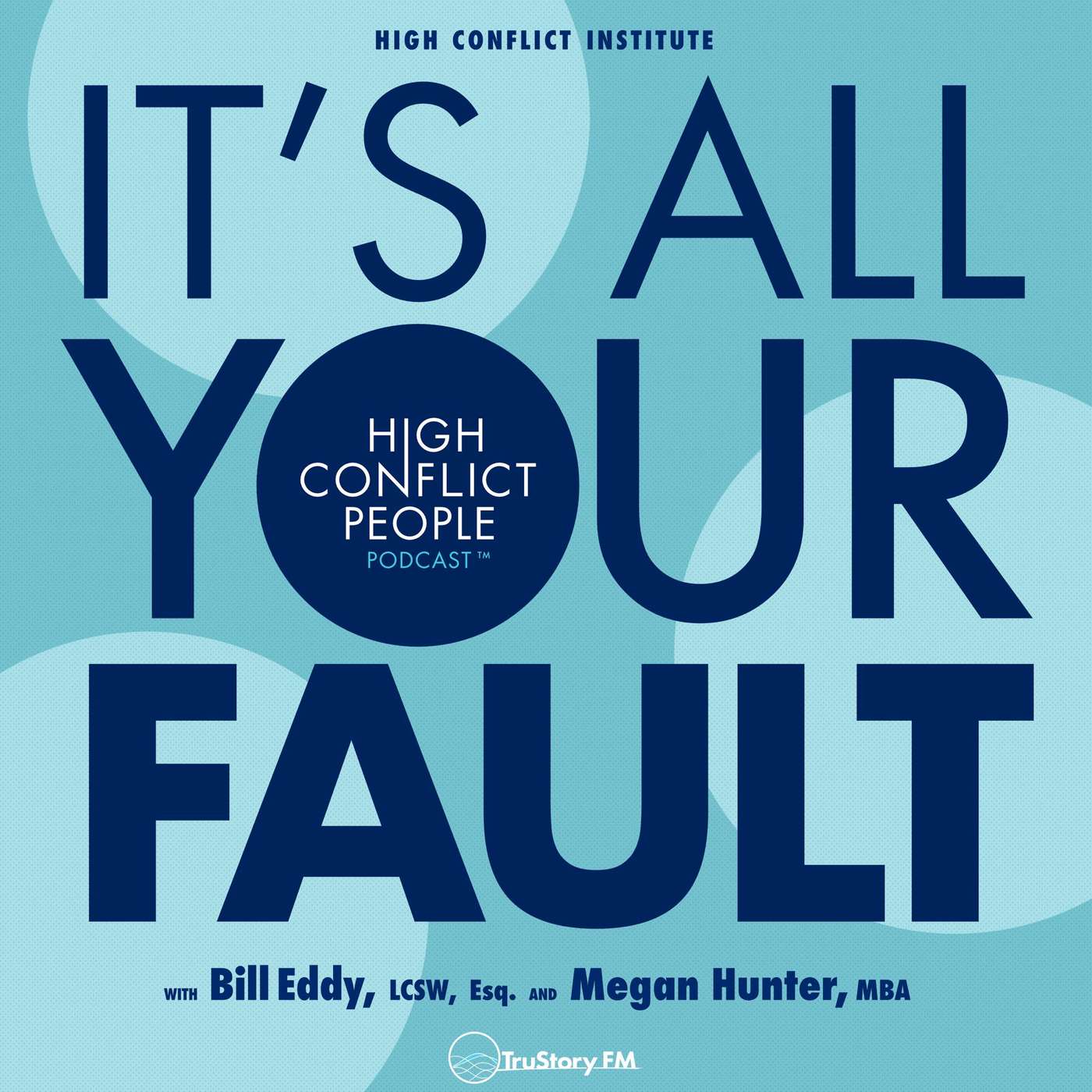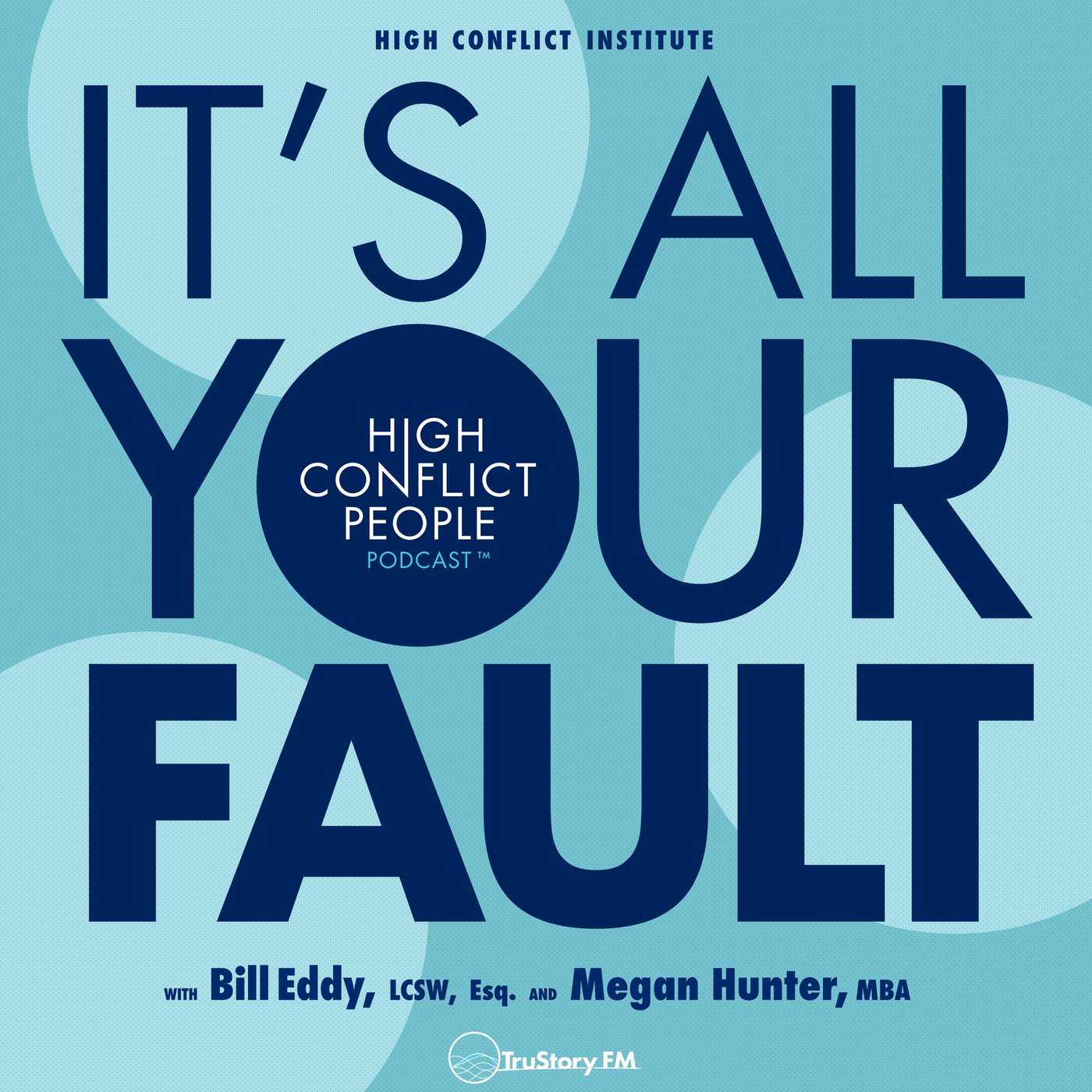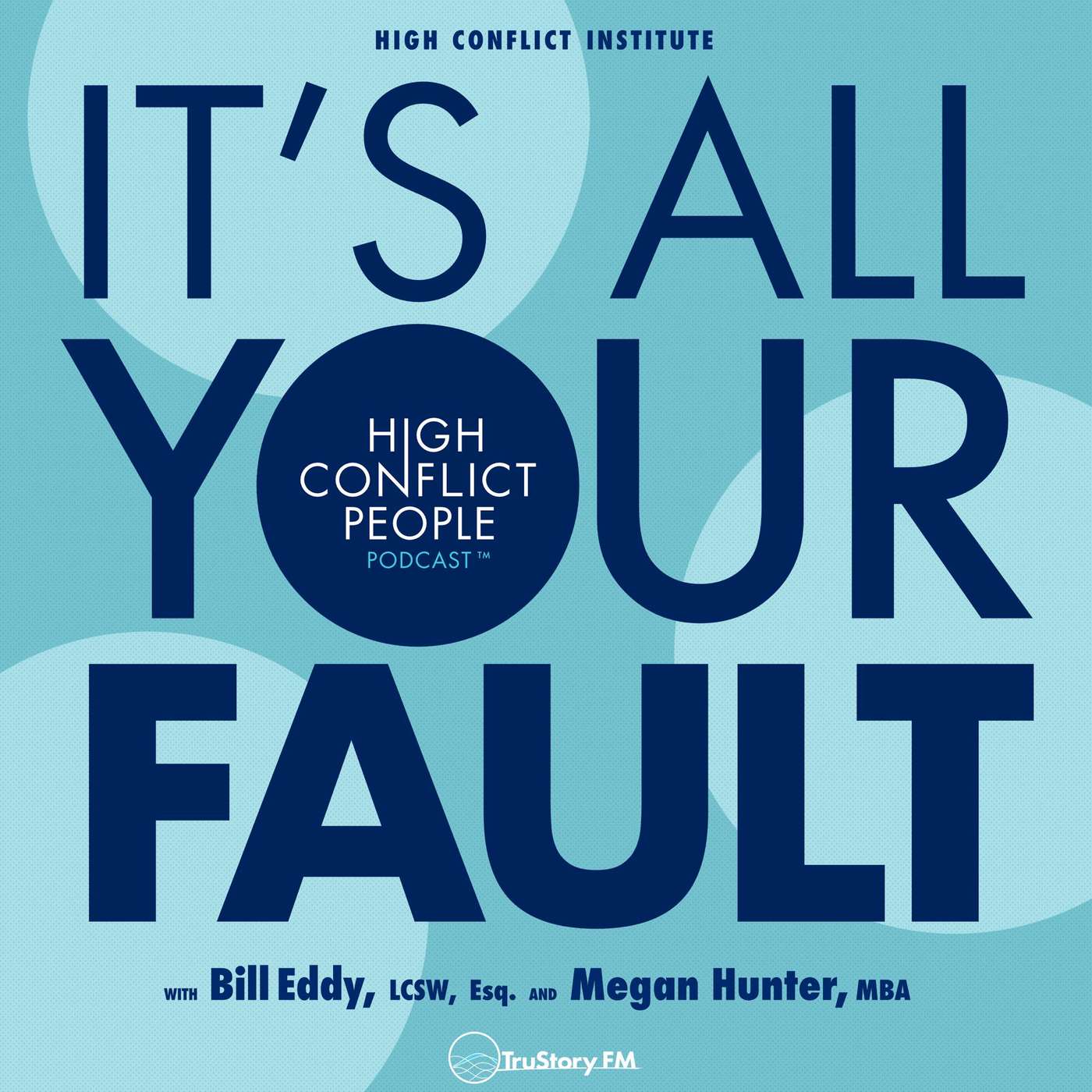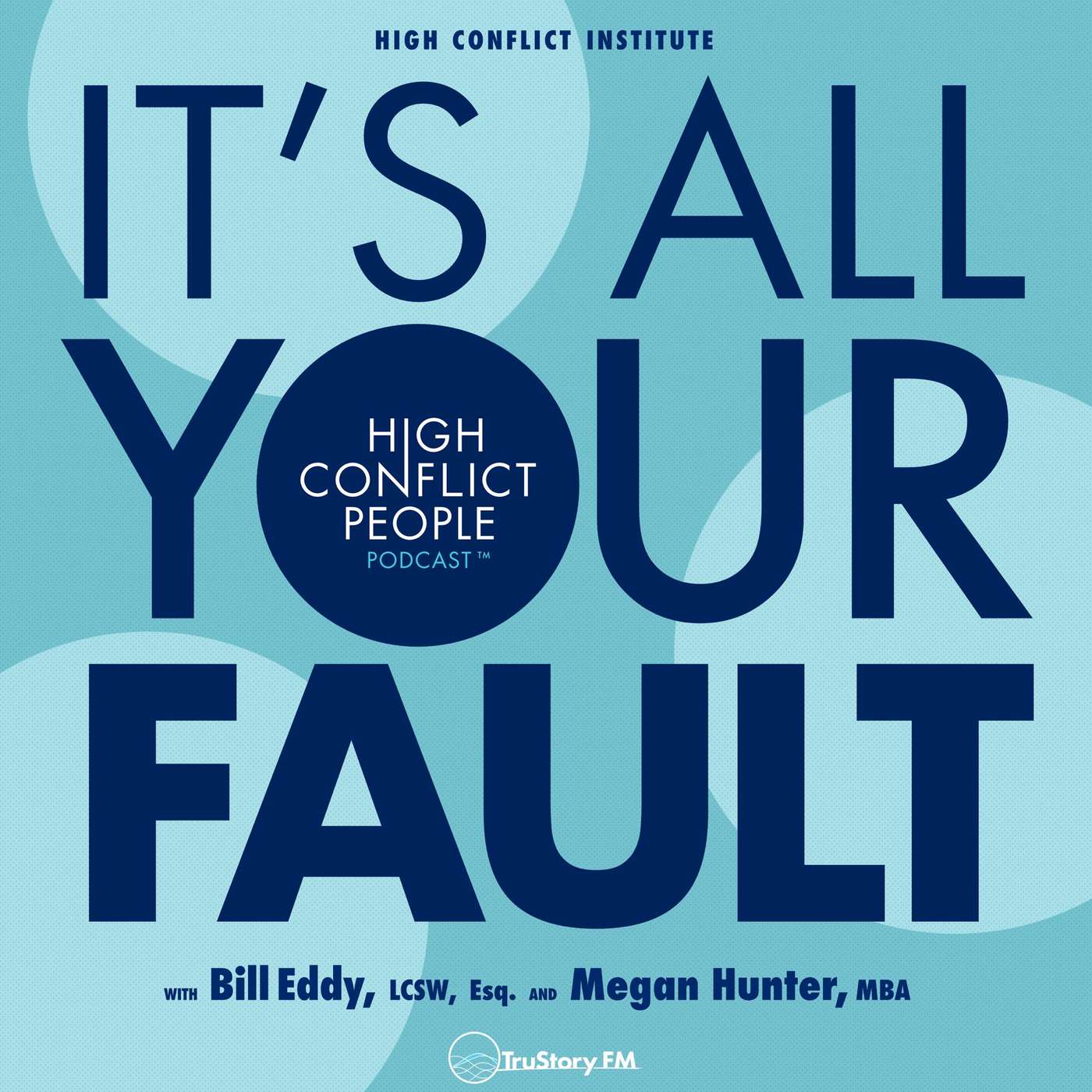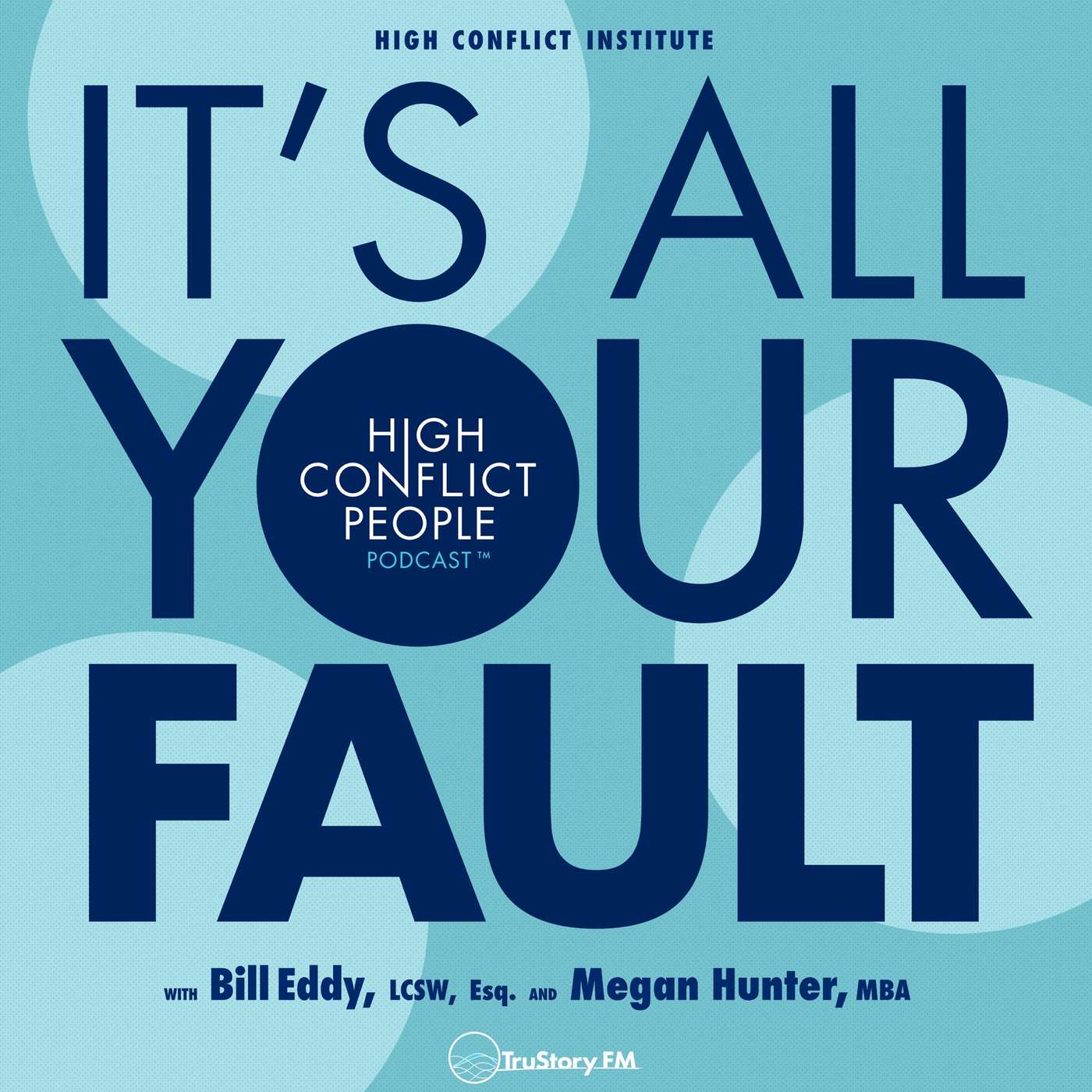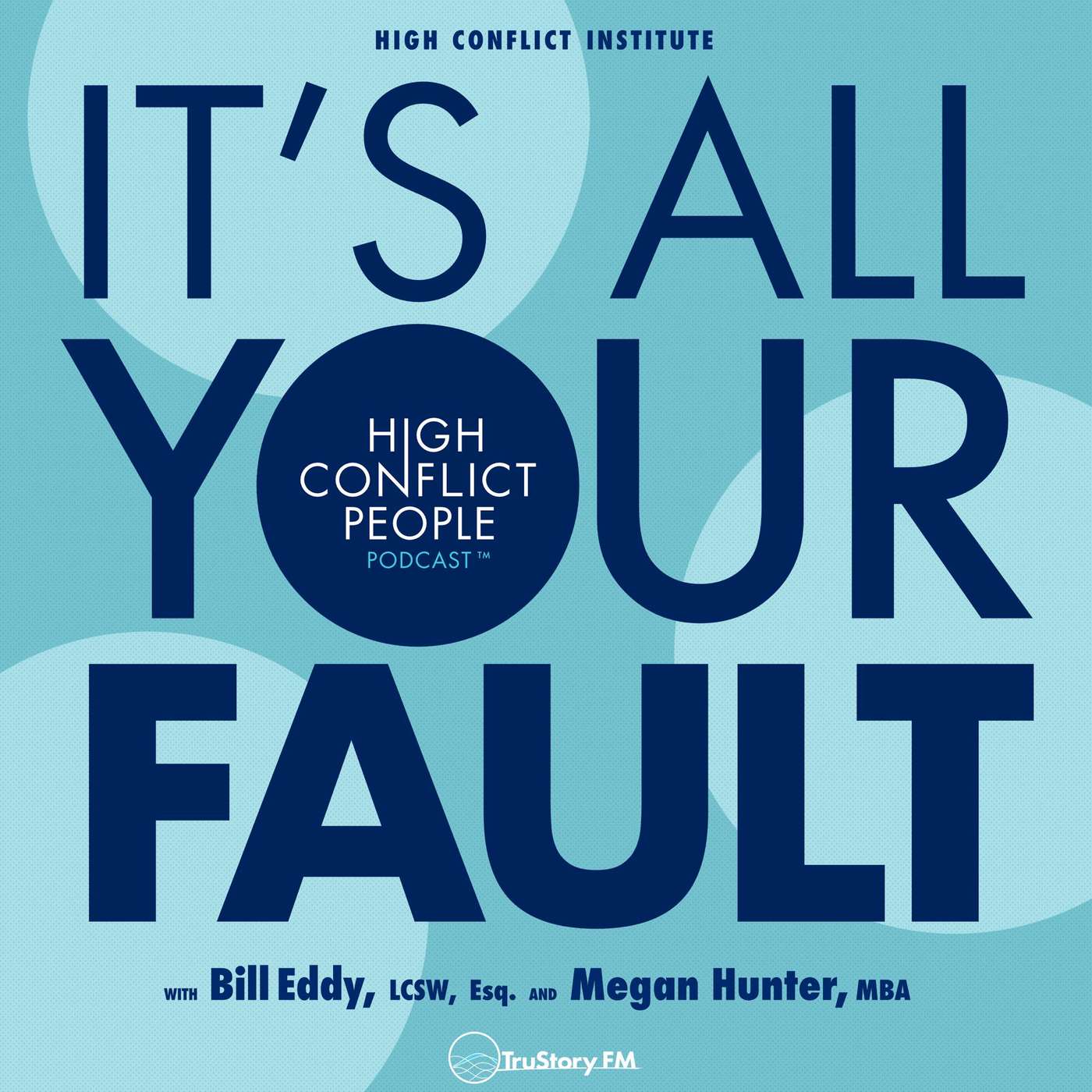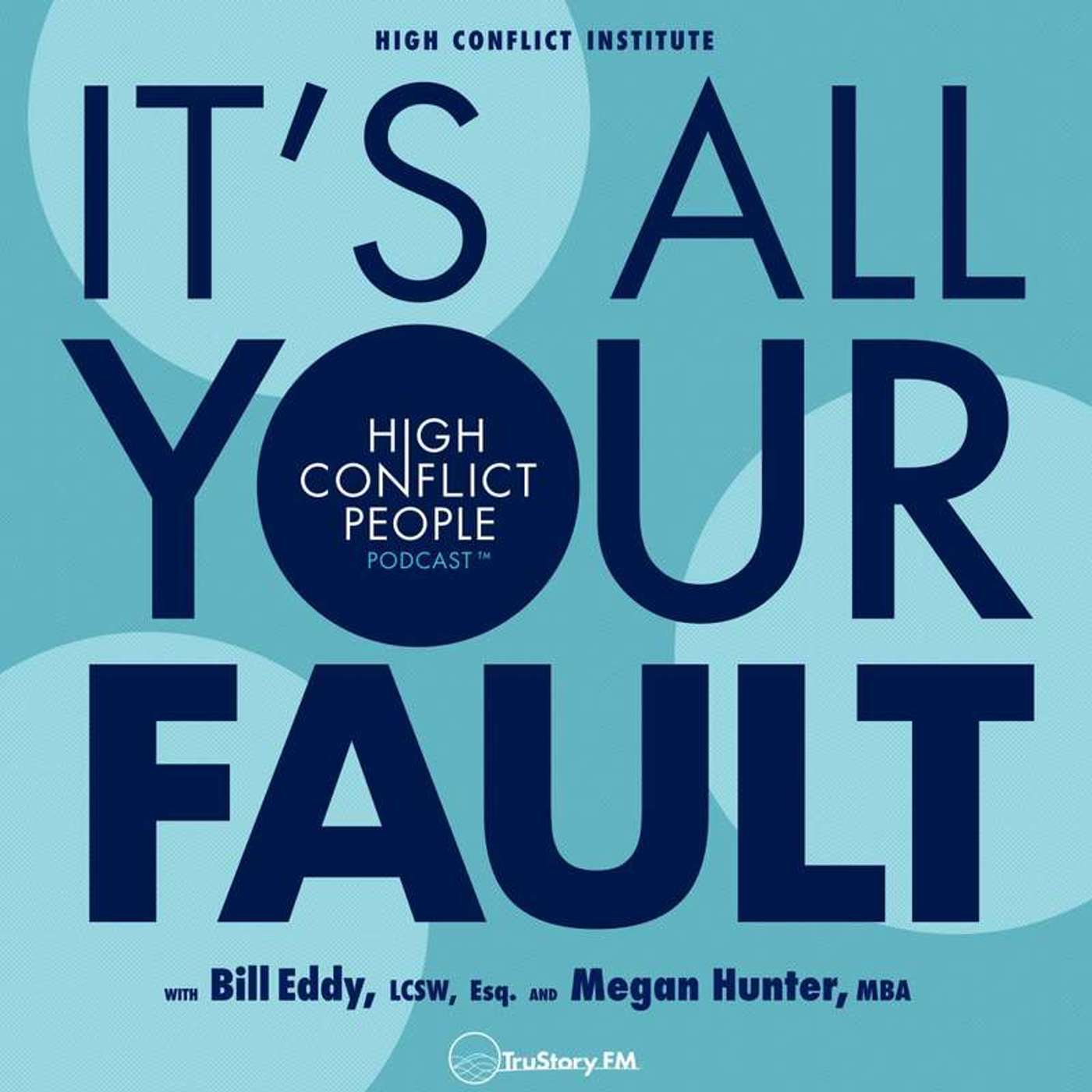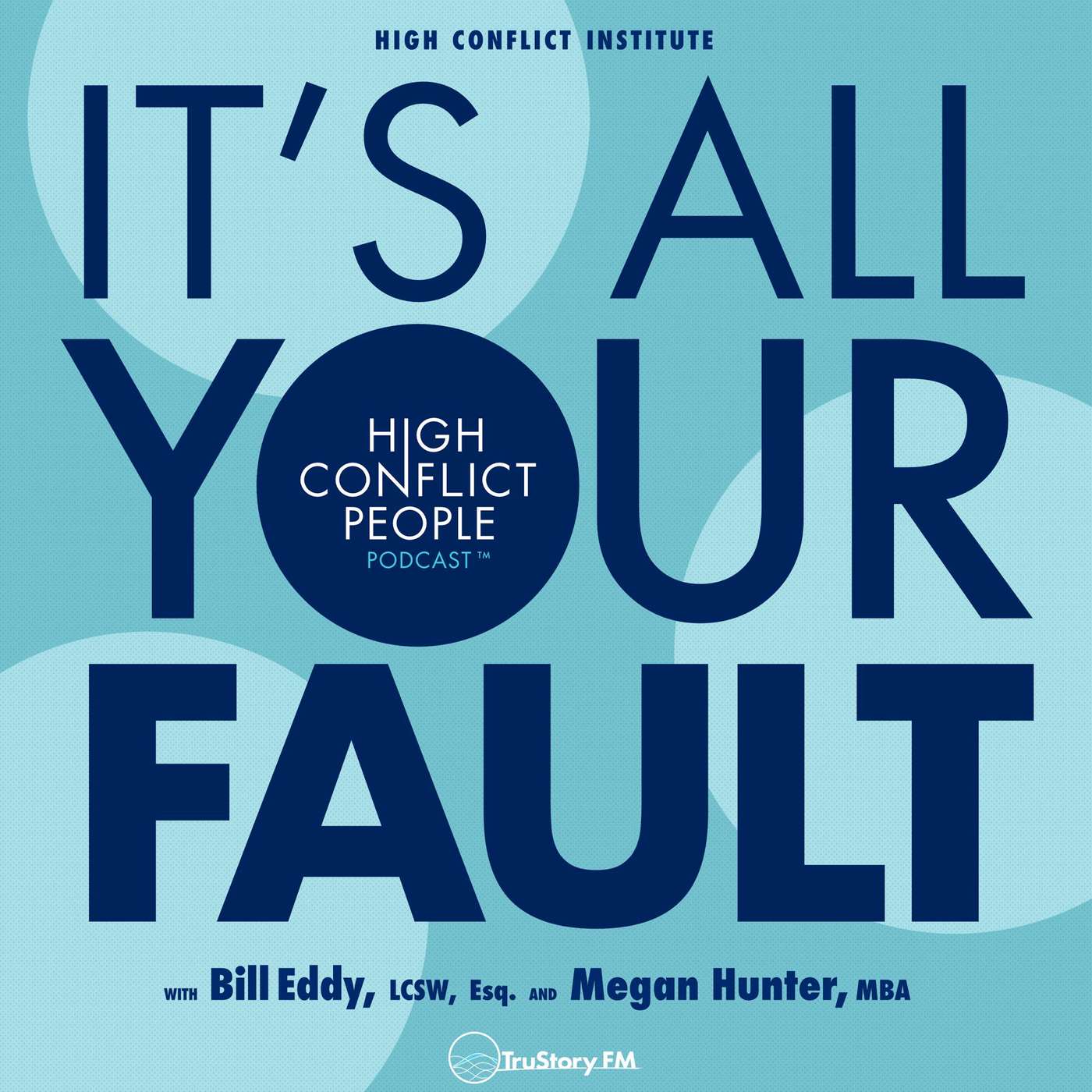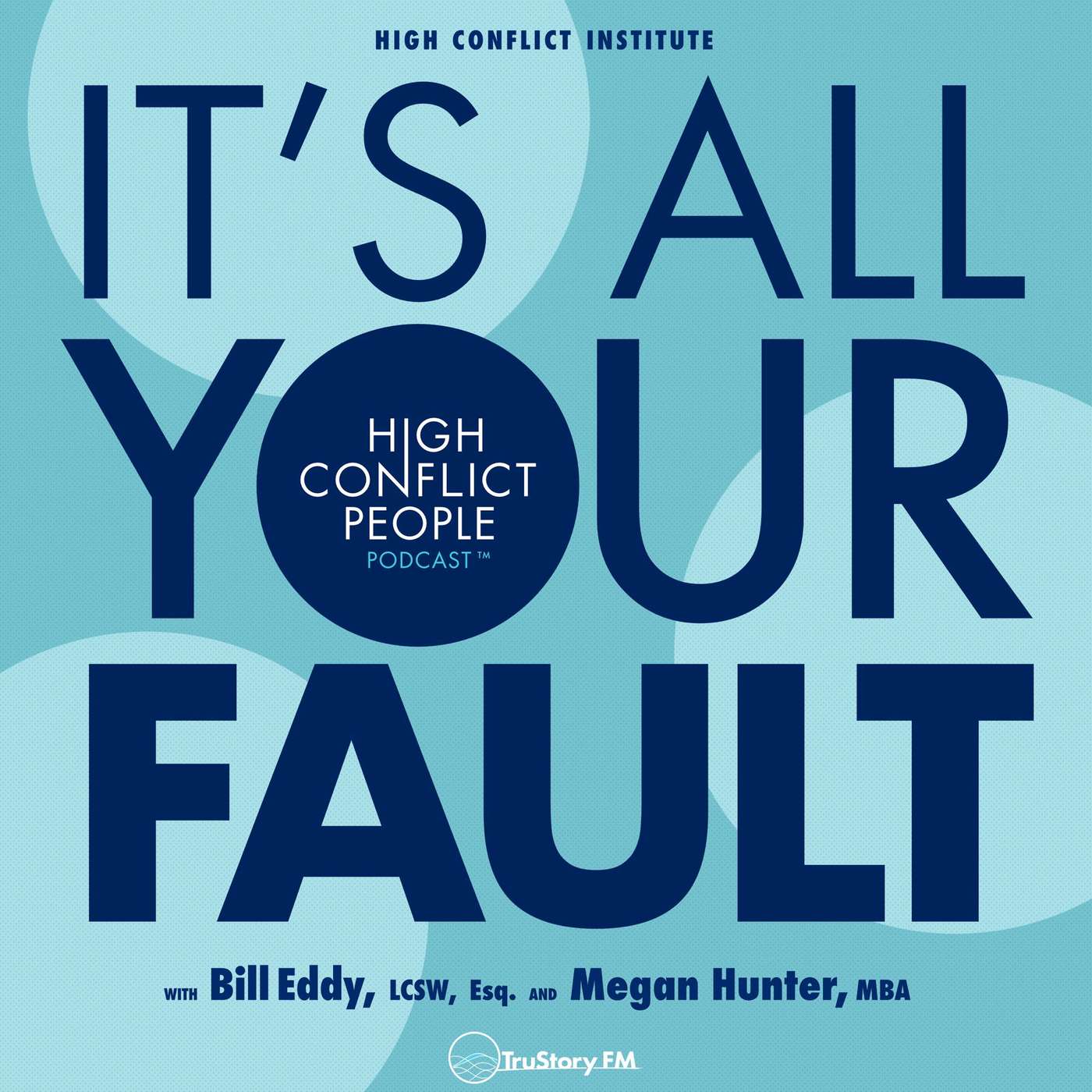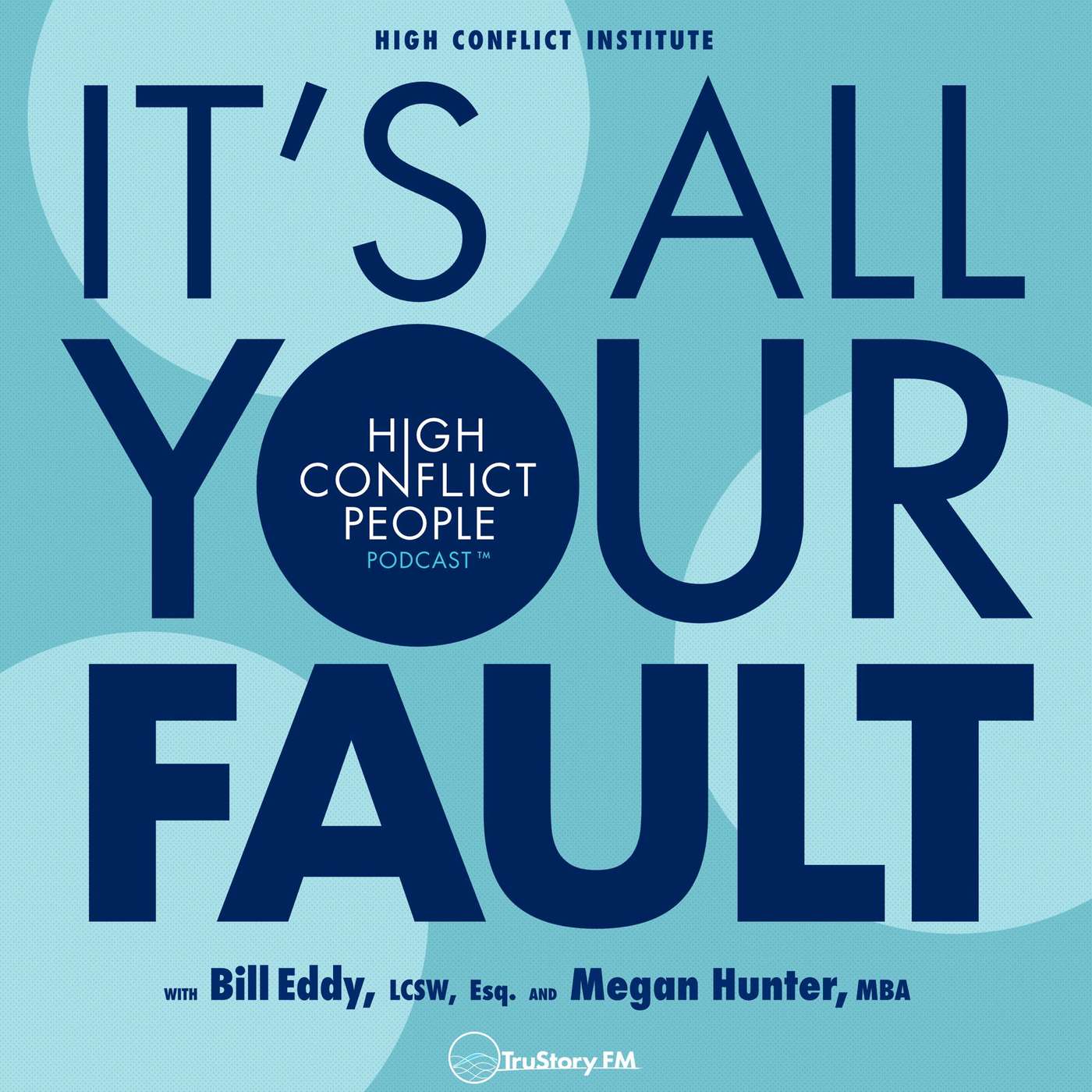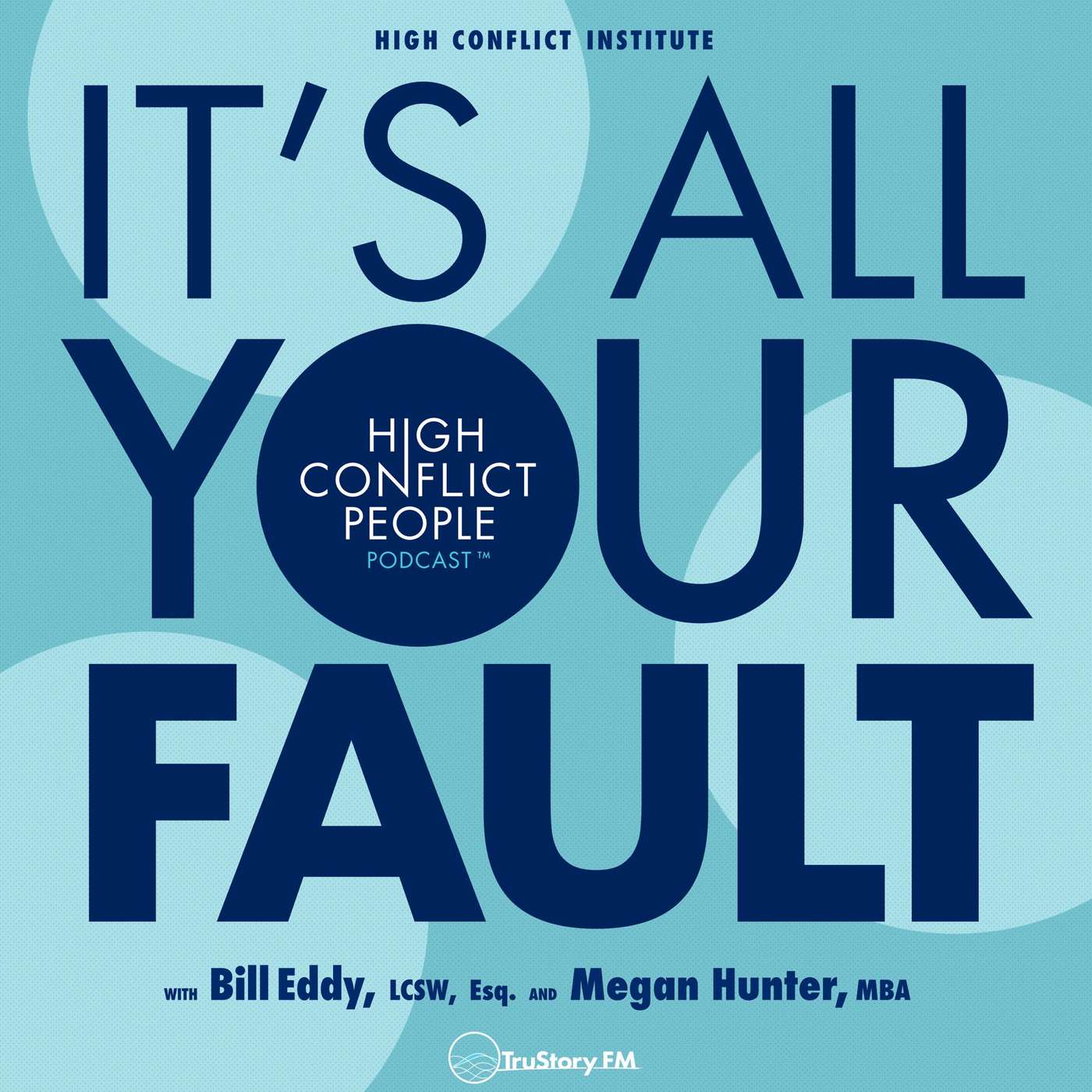Discover It’s All Your Fault: High Conflict People
It’s All Your Fault: High Conflict People

It’s All Your Fault: High Conflict People
Author: TruStory FM
Subscribed: 206Played: 8,572Subscribe
Share
© TruStory FM
Description
Hosted by Bill Eddy, LCSW, Esq. and Megan Hunter, MBA, It’s All Your Fault! High Conflict People explores the five types of people who can ruin your life—people with high conflict personalities and how they weave themselves into our lives in romance, at work, next door, at school, places of worship, and just about everywhere, causing chaos, exhaustion, and dread for everyone else.
They are the most difficult of difficult people — some would say they’re toxic. Without them, tv shows, movies, and the news would be boring, but who wants to live that way in your own life!
Have you ever wanted to know what drives them to act this way?
In the It’s All Your Fault podcast, we’ll take you behind the scenes to understand what’s happening in the brain and illuminates why we pick HCPs as life partners, why we hire them, and how we can handle interactions and relationships with them. We break down everything you ever wanted to know about people with the 5 high conflict personality types: narcissistic, borderline, histrionic, antisocial/sociopath, and paranoid.
And we’ll give you tips on how to spot them and how to deal with them.
They are the most difficult of difficult people — some would say they’re toxic. Without them, tv shows, movies, and the news would be boring, but who wants to live that way in your own life!
Have you ever wanted to know what drives them to act this way?
In the It’s All Your Fault podcast, we’ll take you behind the scenes to understand what’s happening in the brain and illuminates why we pick HCPs as life partners, why we hire them, and how we can handle interactions and relationships with them. We break down everything you ever wanted to know about people with the 5 high conflict personality types: narcissistic, borderline, histrionic, antisocial/sociopath, and paranoid.
And we’ll give you tips on how to spot them and how to deal with them.
192 Episodes
Reverse
Managing High Conflict in Today's WorkplaceIn this episode from the High Conflict Institute archives, Bill Eddy and Megan Hunter welcome Cherolyn Knapp, a lawyer, mediator, and workplace investigator who brings fresh perspectives on handling workplace conflict. While the discussion captures workplace dynamics during an earlier phase of post-pandemic adjustment, the insights on conflict management remain remarkably relevant for today's organizations.Understanding Workplace Conflict PatternsThe discussion explores how traditional workplace conflict resolution methods often fall short with certain behavioral patterns. Cherolyn shares insights from her extensive experience, noting that while standard approaches work for 80-90% of situations, some cases require specialized skills and understanding. Though recorded closer to the initial workplace disruptions of the pandemic, the conversation highlights enduring challenges in managing high conflict situations that continue to resonate.Questions We Answer in This Episode:Why do traditional HR approaches fail with certain behavioral patterns?What makes the New Ways for Work method effective?When should organizations invest in specialized conflict coaching?Key Takeaways:Traditional conflict resolution methods work for most employees but fail with about 10-20% of casesEarly intervention with skill-building can prevent escalation to terminationConnection and empathy are crucial elements in managing high conflict situationsThe New Ways for Work method offers a structured approach that helps organizations identify when standard interventions aren't working and provides alternative strategies. This skills-based program gives both employees and managers practical tools they can implement immediately, proving just as valuable today as when this episode first aired.The episode provides valuable insights for HR professionals, workplace coaches, and leaders seeking to create healthier workplace environments. While some conflict is inevitable in any organization, understanding these patterns and having the right tools can transform seemingly impossible situations into manageable ones.Additional Resources:Books & Training:New Ways for Work® Coaching ManualNew Ways for Work® WorkbookIt's All Your Fault at Work: Managing Narcissists and Other High Conflict PeopleBIFF at Work: Your Guide to Difficult Workplace CommunicationSLIC Solutions for Conflict: Setting Limits & Imposing Consequences in 2 1/2 Steps (Pre-order)Professional Development:New Ways Training RegistrationCustom Training for OrganizationsNew Ways ProgramsConflict Influencer CertificationArticles & Resources:New Ways for Work: A New Coaching MethodWhy Can't They Get It? What to do when coworkers and employees have no idea how they behaveConnect With Us:Visit our websiteSubmit questions for Bill and MeganBrowse our complete collectionFind all episode notesFollow us on Facebook | Twitter | LinkedInNote: Our discussions focus on behavioral patterns rather than diagnoses. For specific legal or therapeutic guidance, please consult qualified professionals in your area.
(00:00) - Welcome to It's All Your Fault
(01:42) - Meet Cherolyn Knapp
(03:42) - Questions
(21:01) - New Ways for Work
(29:25) - Tips
(31:38) - Reminders & Coming Next Week:
(33:42) - Wrap Up
Young Adults Navigating Life with High Conflict ParentsIn this classic episode from the archives, Bill and Megan explore why many young adults struggle to launch successfully into independent life, particularly those raised by parents who demonstrate high conflict behaviors. They examine how today's interconnected world, while offering unprecedented opportunities, can also amplify feelings of inadequacy and isolation for young people trying to find their path.The hosts discuss how growing up with a parent who exhibits self-focused personality traits can leave young adults feeling responsible for managing their parent's emotions instead of developing their own identity. This dynamic, combined with intense cultural pressures and weakened community connections, creates unique challenges for today's emerging adults.Key Challenges Addressed:Constant exposure to global crises and negative newsSocial media comparison and online bullyingWeakened family and community support systemsEssential Solutions Explored:Finding healthy mentors and building support networksEngaging in meaningful work or volunteeringAccessing counseling and group therapy resourcesDrawing from their extensive experience, Bill and Megan offer practical strategies for young adults to develop stronger boundaries with high conflict parents while building their own sense of identity and direction. They emphasize the importance of finding healthy connections and support systems outside the family dynamic.This episode provides valuable insights for young adults working to establish independence, as well as parents, mentors and professionals supporting them through this critical transition period. The discussion highlights how proper support and understanding can help transform struggle into growth.Additional ResourcesBooks & Publications:New Ways for Life™ Instructor's GuideNew Ways for Life™ Youth JournalSLIC Solutions for Conflict: Setting Limits & Imposing Consequences in 2 1/2 StepsTraining & Professional Development:Live Lab™ (1:1 coaching for high conflict communication)Individual Consultation ServicesNew Ways for Life TrainingCustom Training for OrganizationsConflict Influencer ClassArticles & Resources:Kids and Self-EsteemAdolescent Mental Health and New Ways for Life SkillsConnect With Us:Visit High Conflict InstituteSubmit questions for Bill and MeganBrowse our complete collection in our online storeImportant Notice: Our discussions focus on behavioral patterns rather than diagnoses. For specific legal or therapeutic guidance, please consult qualified professionals in your area.
(00:00) - Welcome to It's All Your Fault
(00:35) - State of Floundering Young People
(01:37) - Why So Much Floundering?
(08:49) - Bullying and Stimulation
(12:24) - Parenting
(17:29) - When Truly Floundering
(19:21) - How Many?
(21:45) - Wrap Up
(22:02) - Reminders & Coming Next Week: Are EAR Statements for All High Conflict Types?
In this classic episode from the archives, special guest Cherolyn Knapp joins Bill and Megan to tackle listener questions about managing challenging workplace dynamics. They explore how high conflict behavior manifests in professional settings - from overt confrontations to more subtle forms of workplace disruption.The hosts examine why traditional disciplinary approaches often backfire, discussing instead how skills-based interventions can transform difficult workplace relationships. They emphasize the importance of recognizing that problematic behavior doesn't always present as obvious conflict.Key Workplace Challenges Addressed:Managing interdepartmental tensionsResponding to passive-aggressive behaviorSupporting targeted team membersEssential Skills Explored:Using EAR statements for de-escalationAnalyzing options before taking actionSetting appropriate professional boundariesDrawing from their extensive experience, the hosts provide practical guidance for both supervisors and employees facing challenging workplace dynamics. They emphasize the importance of developing specific communication skills rather than relying on confrontational approaches.This episode offers valuable insights for anyone navigating difficult workplace relationships, whether as a manager protecting their team or an individual seeking to improve a challenging situation. The discussion highlights how proper training and support can transform seemingly intractable workplace conflicts.Additional ResourcesBooks & Expert Publications:BIFF at Work: Your Guide to Difficult Workplace CommunicationsIt's All Your Fault at Work! Managing Narcissists and Other High-Conflict PeopleOur New World of Adult BulliesSLIC Solutions for Conflict: Setting Limits & Imposing Consequences in 2 1/2 StepsTraining & Professional Development:New Ways Training Programs (for workplace professionals)Individual Workplace CoachingCustom Training for OrganizationsConflict Influencer Class (for personal situations)Connect With Us:Visit High Conflict InstituteSubmit questions for Bill and MeganBrowse our complete collection in our online storeFind all episode notes on our websiteImportant Notice: Our discussions focus on behavioral patterns rather than diagnoses. For specific legal or therapeutic guidance, please consult qualified professionals in your area.
(00:00) - Welcome to It's All Your Fault
(01:34) - Welcome Back Cherolyn
(03:05) - Listener Question #1: Dealing With a Workplace Bully
(09:38) - EAR Statements and Connecting
(11:57) - What to Say
(13:57) - How High Conflict ‘Presents’
(17:04) - Passive Aggressive
(19:36) - How to Deal With Them
(22:43) - Dealing With Abuse Enablers
(28:55) - New Ways for Work
(35:50) - New Ways for Work Leaders
(39:42) - Reminders & Coming Next Week: Another Guest!
Holiday Peace: Managing High Conflict Personalities During CelebrationsBill Eddy and Megan Hunter return to explore practical strategies for handling challenging personalities during holiday gatherings. As many of our longtime listeners enjoy revisiting this timeless discussion during our winter programming, we're pleased to reshare these essential tools for maintaining peace while preserving relationships during family events.Understanding high conflict personalities requires both preparation and practice. Through real-world examples and expert insights, this conversation illuminates the complex dynamics that often emerge during holiday celebrations. Whether managing others' behaviors or our own stress responses, the techniques shared here have proven invaluable for countless families.Key Strategies:Set clear boundaries before gatheringsUse the BIFF method (Brief, Informative, Friendly, Firm)Create physical space when neededWhat You'll Learn:How to prepare mentally for difficult encountersWays to protect your personal peaceTechniques for graceful exits from heated discussionsThe intersection of family traditions and modern challenges requires a nuanced approach. Bill and Megan discuss how to honor meaningful connections while establishing new patterns that better serve everyone involved. Their practical guidance helps listeners navigate complex family dynamics without sacrificing their own wellbeing.Our conversations focus on behavioral patterns rather than specific diagnoses. While these strategies can be helpful for many situations, please consult qualified professionals in your area for specific legal or mental health guidance.Additional Resources:BOOKSCalming Upset People with EARBIFFBIFF for CoParent CommunicationThe Courage to FeelThe High-Conflict Co-Parenting Survival GuideARTICLESEAR Statements for the HolidaysHandling High Conflict Situations During the HolidaysHow to Survive the Holidays with an Anti-Social RelativeEXPERT PUBLICATIONSNew Book: SLIC Solutions for Conflict: Setting Limits & Imposing Consequences in 2 1/2 StepsPROFESSIONAL DEVELOPMENTCustom Training & SpeakingNew Ways Training ProgramsConflict Influencer ClassCONNECT WITH USHigh Conflict InstituteSubmit Questions for the PodcastBrowse Our Complete Book CollectionView All Episode NotesOur discussions focus on behavioral patterns rather than diagnoses. For specific legal or therapeutic guidance, please consult qualified professionals in your area.
(00:00) - Welcome to It's All Your Fault
(01:42) - Holiday Conflict
(02:34) - Tips to Stop Holiday Conflict
(08:54) - Assumptions
(09:53) - One More Tip
(10:37) - A Family of Multiple HCPs
(12:24) - The Overly Sensitive Person
(14:34) - The Narcissist
(15:50) - When Alone
(24:59) - HCP Whiplash
Setting Limits That Stick: The SLIC Approach to Conflict ResolutionBill Eddy and Megan Hunter discuss SLIC Solutions for Conflict: Setting Limits and Imposing Consequences in 2 1/2 Steps, co-authored by Bill Eddy and Ekaterina Ricci. This episode explores how their practical SLIC method (Setting Limits, Imposing Consequences) helps parents establish and maintain effective boundaries with children of all ages.Understanding the SLIC MethodThe SLIC approach combines three key elements: setting clear limits, imposing appropriate consequences, and using strategic empathy statements. This 2 1/2 step method provides a structured framework for parents facing boundary-testing behaviors, whether dealing with toddlers learning self-control or teenagers pushing social limits. Bill's extensive background in child development, education, and family therapy informs practical applications across various parenting scenarios.Questions Answered in This EpisodeWhat are the five key questions to ask when imposing consequences?How should consequences vary by age and development stage?When and how should parents collaborate with teachers on limits?What makes limit-setting effective in divorced family situations?How can parents overcome fear of setting firm boundaries?Key TakeawaysProportional consequences maintain effectiveness and teach responsibilityEarly limit-setting creates foundation for teenage boundary acceptanceParent-teacher-community alignment strengthens limit enforcementBoth positive and negative consequences play essential rolesThe SLIC method works across various family structures and situationsThis episode equips parents, teachers, and caregivers with practical tools from the SLIC method to establish consistent, effective boundaries while maintaining strong relationships with children. Listeners learn how to implement this structured approach across different ages and challenging situations.Additional ResourcesExpert PublicationsNew Book available for pre-order: SLIC Solutions for Conflict: Setting Limits & Imposing Consequences in 2 1/2 StepsProfessional DevelopmentInvite us to speak at your organizationNew Ways Training (work, mediation, divorce)Conflict Influencer Class (for personal life)Connect With UsVisit High Conflict Institute: highconflictinstitute.comSubmit questions for Bill and MeganBrowse our complete collection of books and resources in our online store—available in print and e-book formatsFind these show notes and all past episode notes on our websiteWatch this episode on YouTube!Important NoticeOur discussions focus on behavioral patterns rather than diagnoses. For specific legal or therapeutic guidance, please consult qualified professionals in your area.
(00:00) - Welcome to It's All Your Fault
(00:46) - Setting Limits
(01:22) - Bill’s New Book
(04:35) - Young Children
(10:29) - Do Consequences Work For Everyone?
(14:42) - Five Questions
(16:46) - Teacher and Student
(20:36) - Overcoming Fear of Setting Limits
(22:53) - Older Kids
(31:58) - Wrap Up
Identifying Red Flags: Making Safer Relationship ChoicesDr. David Wexler joins Bill Eddy to discuss his new book "Choose Him Wisely: How to Identify a Safe Partner," co-authored with Dr. Donald Meichenbaum. Drawing from over 40 years of clinical experience working with relationship dynamics and domestic violence, Dr. Wexler shares crucial insights about recognizing concerning patterns early in relationships.Understanding Warning SignsThe conversation explores three key categories of warning signs: observed behaviors, historical factors, and gut feelings. Dr. Wexler explains how early relationship behaviors like "love bombing," expressions of contempt, and patterns of entitlement can indicate potential future challenges. The discussion examines why psychological abuse often creates deeper lasting impacts than physical abuse through its systematic erosion of self-esteem and autonomy.Questions Answered in This EpisodeWhat are the top three warning signs of potentially abusive relationships?How can someone distinguish between healthy attention and concerning obsession?Why do people sometimes ignore clear warning signs?What role does family history play in relationship patterns?When is couples therapy helpful or potentially harmful?Key TakeawaysEarly relationship intensity ("love bombing") warrants careful evaluationExpressions of contempt and entitlement serve as significant red flagsPersonal boundaries and gut feelings provide valid assessment criteriaUnderstanding attachment patterns helps explain relationship choicesSelf-blame often prevents recognition of concerning behaviorsThis episode provides valuable tools for anyone navigating dating and relationships, offering practical guidance for evaluating potential partners while maintaining healthy boundaries. The discussion emphasizes empowerment through awareness rather than victim-blaming, acknowledging that while warning signs exist, many relationships can provide safe, healthy connections.Additional ResourcesDr. WexlerBook: Choose Him WiselyRelationship Training InstituteOnline Course for Family Law: Conversations About Domestic Violence in Family Law with 16 Experts Law PrfProfessional DevelopmentInvite us to speak at your organizationNew Ways Training (work, mediation, divorce)Conflict Influencer Class (for personal life)Connect With UsVisit High Conflict Institute: highconflictinstitute.comSubmit questions for Bill and MeganBrowse our complete collection of books and resources in our online store—available in print and e-book formatsFind these show notes and all past episode notes on our websiteWatch this episode on YouTube!Important NoticeOur discussions focus on behavioral patterns rather than diagnoses. For specific legal or therapeutic guidance, please consult qualified professionals in your area.
(00:00) - Welcome to It's All Your Fault
(00:42) - Dr. David Wexler
(02:41) - David’s Book Choose Him Wisely
(03:42) - David’s Background
(09:23) - Warning Signs
(14:25) - Obstructions
(23:18) - Psychological vs. Physical Abuse
(26:53) - From Victim to Abuser
(30:33) - Where Is the Line?
(35:09) - Gut Feeling Test
(38:07) - Counseling and Couples Counseling
(43:34) - Wrap Up
Healthcare Conflict Management: Insights from the Pandemic and BeyondIn this episode of "It's All Your Fault," host Megan Hunter welcomes Dr. Jeff Stuart, an experienced physician executive and co-founder of RxSolve Conflict, to discuss conflict management in healthcare settings. Their conversation explores how the pandemic transformed healthcare conflicts and what lessons can help improve communication and patient care.Understanding Healthcare Conflict DynamicsDr. Stuart shares insights from his three decades of medical practice and leadership, including his experience as Chief Medical Officer during the pandemic. He describes how hospitals function as inherently high-pressure environments where different departments operate as distinct "battlefields," each with their own unique pressures and challenges.The discussion reveals how operational pressures, resource constraints, and evolving power dynamics contribute to healthcare conflicts. Dr. Stuart explains how traditional hierarchical structures are shifting toward team-based approaches, creating new communication challenges that require innovative solutions.Questions We Answer in This EpisodeHow did the pandemic affect conflict dynamics in healthcare settings?What are the primary sources of conflict in healthcare environments?How can healthcare professionals better manage high-stress interactions?What role does communication training play in preventing healthcare conflicts?How can healthcare leaders support better conflict management?Key TakeawaysHealthcare conflicts often arise from competing priorities and resource constraintsRole ambiguity and poor communication channels amplify conflict potentialBasic conflict management training can significantly improve healthcare interactionsThe pandemic created unique challenges but also opportunities for improved communicationLeadership engagement is crucial for implementing effective conflict management strategiesThis episode provides valuable insights for healthcare professionals, administrators, and anyone interested in understanding how complex organizations can better manage conflict. The discussion offers practical approaches while acknowledging the unique challenges faced by those working in high-stress medical environments.Additional ResourceDr. Jeff Stuart’s website: www.rxsolveconflict.comProfessional DevelopmentLeaders High-Conflict Training: New Ways for WorkConflict Influencer Group ClassConnect With UsVisit High Conflict Institute: highconflictinstitute.comSubmit questions for Bill and MeganBrowse our complete collection of books and resources in our online store—available in print and e-book formatsFind these show notes and all past episode notes on our websiteWatch this episode on YouTube!Important NoticeOur discussions focus on behavioral patterns rather than diagnoses. For specific legal or therapeutic guidance, please consult qualified professionals in your area.
(00:00) - Welcome to It's All Your Fault
(00:58) - Dr. Jeff Stuart
(03:22) - Jeff’s Background
(10:10) - CMO Experience During Pandemic
(16:02) - Conflict with Travelling Professionals
(16:51) - Stuck in Storming
(19:45) - Biggest Conflicts in Healthcare
(25:24) - Making Conflicts Bigger
(31:50) - Preventative
(33:02) - Continual Societal Breakdowns
(35:29) - Momentum and Problem-Solving
(46:30) - Delineations
(48:10) - Wrap Up
Navigating Grandparent Roles in High Conflict DivorcesThis episode of "It's All Your Fault" features Bill Eddy and Megan Hunter addressing two distinct listener questions. The first explores the challenging position grandparents face when their adult children experience contentious divorces. The second examines complex co-parenting dynamics involving an ex-spouse demonstrating high conflict behavior and a new spouse seeking involvement.Understanding Family Dynamics in High Conflict SituationsThe hosts examine how family members can effectively navigate these challenging situations while maintaining appropriate boundaries. They discuss practical strategies for managing communication, setting limits, and fostering healthy relationships during custody disputes and co-parenting arrangements.First Listener Question: Grandparent Support During DivorceHow can grandparents maintain supportive relationships with both parents?What strategies help when grandchildren show signs of alienation?How should grandparents respond to concerning statements from grandchildren?When should grandparents intervene versus step back?What approaches help maintain healthy boundaries while supporting the family?Second Listener Question: Co-Parenting with Ex-Spouse and New WifeHow to manage communication with an ex-spouse showing high conflict behavior?What boundaries make sense when dealing with military-related trauma?Should you engage with the new wife's attempts at relationship building?How to maintain BIFF communication effectively?When is parallel parenting more appropriate than attempted collaboration?Throughout the episode, the hosts emphasize several key approaches for managing these complex situations. They stress the importance of setting clear, matter-of-fact limits to maintain healthy relationships and recommend using the "four big skills" framework when teaching children appropriate behaviors. The discussion highlights how parallel parenting often proves more sustainable than forced closeness, and emphasizes the value of building trust gradually rather than rushing relationships. The hosts also underscore the importance of maintaining healthy skepticism while remaining open to positive developments in these challenging family dynamics.The episode provides valuable insights for grandparents, divorced parents, and new spouses navigating complex family dynamics. While recognizing the challenges of these situations, the hosts offer practical approaches that prioritize children's wellbeing while maintaining appropriate boundaries.Additional ResourcesExpert Publications⇨ Book (pre-orders - publishing November 2025): SLIC Solutions for Conflict: Setting Limits & Imposing Consequences in 2 1/2 Steps⇨ Book: BIFF for CoParent Communication (Appendix B mentioned in podcast)⇨ Book: Don't Alienate the KidsPersonal Transformation Solutions⇨ Conflict Influencer® 6-week class (Zoom) for everyone⇨ New Ways for Families® Co-parenting Without Court Online Class (with optional coaching - mentioned in podcast)⇨ 1:1 Coaching & Consultation (For Your Legal Case w/ Bill Eddy; For Other Situations w/ Megan Hunter)Professional Development⇨ Bill Eddy's Signature New Ways Training (for mediators; for counselors and divorce coaches; for workplace coaches; for workplace leaders)Connect With Us⇨ Visit High Conflict Institute: highconflictinstitute.com⇨ Submit questions for Bill and Megan⇨ Browse our complete collection of books and resources in our online store—available in print and e-book formats⇨ Find these show notes and all past episode notes on our websiteWatch this episode on YouTube!Important NoticeOur discussions focus on behavioral patterns rather than diagnoses. For specific legal or therapeutic guidance, please consult qualified professionals in your area.
(00:00) - Welcome to It's All Your Fault
(00:38) - More Listener Questions
(01:20) - Grandparents in High Conflict Divorces
(18:21) - Settling Limits with Ex and His New Wife
(28:46) - Wrap Up
Navigating Complex Relationships: From Personal Transformation to Step-Family DynamicsBill Eddy and Megan Hunter explore two compelling listener questions involving relationship challenges and personal growth. This episode provides valuable insights for anyone dealing with complex interpersonal dynamics or seeking lasting behavioral change.Understanding Personal Transformation and High-Conflict RelationshipsThe episode examines how individuals can create meaningful change in their lives through skill development and self-awareness. The hosts discuss practical approaches for managing challenging relationships, particularly in blended family situations where communication difficulties arise between step-parents and biological parents.Questions Addressed in This Episode:How can someone break long-standing behavioral patterns?What role do skills like flexible thinking and emotional management play in personal change?How can step-parents navigate challenging relationships with their partner's ex?What communication strategies work best when dealing with hostile messages?How can someone maintain boundaries while keeping communications focused on children?Key Takeaways:Change is possible through developing specific skills: flexible thinking, managed emotions, moderate behavior, and self-checkingCreating new behavioral patterns rather than trying to eliminate old onesThe value of "extinction" in managing difficult communicationsImportance of responding only to relevant information in hostile messagesUnderstanding that others' hostile behavior reflects their operating system, not personal failingThe hosts emphasize the BIFF method (Brief, Informative, Friendly, and Firm) as a cornerstone communication strategy, along with other practical approaches such as focusing on logistics and future-oriented communications, maintaining boundaries while staying civil, recognizing when non-response is the best response, and separating emotional content from necessary information. These tools provide actionable approaches for anyone seeking to improve challenging relationships or create lasting personal change, while emphasizing the importance of skill development and consistent practice.Additional ResourcesExpert PublicationsBook (pre-orders being taken - publishing November 2025): SLIC Solutions for Conflict: Setting Limits & Imposing Consequences in 2 1/2 StepsBook: 5 Types of People Who Can Ruin Your LifePersonal TransformationConflict Influencer® 6-week class (Zoom) for everyoneNew Ways for Families® Co-parenting Without Court Online Class (with optional coaching)1:1 Coaching & Consultation (For Your Legal Case w/ Bill Eddy; For Other Situations w/ Megan Hunter)Professional DevelopmentBill Eddy's Signature New Ways Training (for mediators; for counselors and divorce coaches; for workplace coaches; for workplace leaders)Connect With UsVisit High Conflict Institute: highconflictinstitute.comSubmit questions for Bill and MeganBrowse our complete collection of books and resources in our online store—available in print and e-book formatsFind these show notes and all past episode notes on our websiteWatch this episode on YouTube!Important NoticeOur discussions focus on behavioral patterns rather than diagnoses. For specific legal or therapeutic guidance, please consult qualified professionals in your area.
(00:00) - Welcome to It's All Your Fault
(00:41) - Listener Question #1
(11:16) - Listener Question #2
(28:52) - Reminders
Navigating Hostile Neighbor Situations: Understanding and Managing Community ConflictResponding to a listener question, Bill Eddy and Megan Hunter address a challenging situation many face: dealing with hostile neighbors. This episode explores strategies for maintaining composure while protecting yourself and your family when faced with neighborhood tensions, providing practical insights for those experiencing community conflict.Understanding Neighborhood Conflict DynamicsThe hosts analyze how neighborhood disputes can escalate from initial interactions into ongoing patterns of hostile behavior. They examine how children can be affected by and involved in neighborhood tensions, offering guidance for parents navigating these complex dynamics.Questions Answered in This EpisodeHow can you balance standing up for yourself while keeping situations calm?When and how should you involve law enforcement?What legal options exist for addressing neighbor conflicts?How can parents protect children from neighborhood hostility?Key TakeawaysConsider investigating neighborhood dynamics before purchasing propertyDocument problematic behaviors through appropriate channelsFocus on teaching children effective conflict management skillsRemember that disengagement can sometimes be the safest strategyThis episode offers valuable strategies for anyone experiencing neighborhood tensions, emphasizing the importance of making informed decisions that prioritize safety and well-being while maintaining appropriate boundaries. The hosts' practical approach helps listeners understand when to engage, when to seek help, and when to consider other options.Additional ResourcesBook us for Training or KeynoteExpert PublicationsBook: It’s All Your Fault!Book: Our New World of Adult BulliesPersonal TransformationConflict Influencer® 6-week class (Zoom) for everyoneNew Ways for Families® Co-parenting Without Court Online Class (with optional coaching)1:1 Coaching & Consultation (For Your Legal Case w/ Bill Eddy; For Other Situations w/ Megan Hunter)Professional DevelopmentBill Eddy's Signature New Ways Training (for mediators; for counselors and divorce coaches; for workplace coaches; for workplace leaders)Connect With UsVisit High Conflict Institute: highconflictinstitute.comSubmit questions for Bill and MeganBrowse our complete collection of books and resources in our online store—available in print and e-book formatsFind these show notes and all past episode notes on our websiteWatch this episode on YouTube!Important NoticeOur discussions focus on behavioral patterns rather than diagnoses. For specific legal or therapeutic guidance, please consult qualified professionals in your area.
(00:00) - Welcome to It's All Your Fault
(00:38) - Listener Question: Civility and Bullying
(02:58) - Keeping Things Calm in the Face of Hostility
(07:00) - Dogs and Kids
(10:45) - Involving Law Enforcement
(14:55) - Vindictiveness
(22:53) - Raising The Child
(25:52) - The Four Big Skills
(27:46) - Traffic
(33:49) - Wrap Up
In this our next listener’s questions episode, High Conflict Institute co-founders Megan Hunter and Bill Eddy address three complex scenarios involving challenging relationship dynamics, boundary setting, and family conflicts.Mike seeks advice about an ex-girlfriend who refuses to leave his home despite receiving money to do so, using suicide threats as leverage. The hosts discuss implementing their new SLIC method (Setting Limits, Imposing Consequences) and the importance of following through with consequences while having appropriate support systems in place. They emphasize that enabling behavior rarely leads to positive change.Leonard from Sweden asks about common response patterns when high-conflict people face criticism. Bill explains typical reactions including denial, blame-shifting, playing victim, and counter-accusations. The hosts emphasize avoiding criticism in favor of future-focused communication and setting clear boundaries with consequences.A couple dealing with high-conflict aging parents seeks strategies for managing necessary family relationships. The hosts discuss balancing caregiving responsibilities with boundary setting, offering practical approaches for limiting problematic behaviors while maintaining connections. They emphasize matter-of-fact communication and consistent enforcement of stated consequences.Throughout these scenarios, common themes emerge: the importance of preparing for predictable reactions, maintaining firm but respectful boundaries, and avoiding the trap of criticism. The episode demonstrates how similar principles can help navigate different types of high-conflict situations, whether with ex-partners, aging parents, or other family members who exhibit challenging behaviors.Additional ResourcesPersonal GrowthNew Ways for Families ® Online ClassConflict Influencer® Class (6 weeks on Zoom)BooksSLIC Solutions for Conflict (pre-order)It’s All Your FaultOur New World of Adult BulliesConsultationsBook us for a consultation about your high-conflict situation or legal caseTrainingInquire about having us train your organizationConnect With UsVisit High Conflict Institute: highconflictinstitute.comSubmit questions for Bill and MeganBrowse our complete collection of books and resources in our online store—available in print and e-book formatsFind these show notes and all past episode notes on our websiteWatch this episode on YouTube!Important NoticeOur discussions focus on behavioral patterns rather than diagnoses. For specific legal or therapeutic guidance, please consult qualified professionals in your area.
(00:00) - Welcome to It's All Your Fault
(00:46) - Listener Question #1
(12:49) - Listener Question #2
(24:12) - Listener Question #3
(33:48) - Wrap Up
When High Conflict Personalities InteractIn this listener-driven episode, High Conflict Institute co-founders Megan Hunter and Bill Eddy tackle three complex scenarios from listeners, exploring relationship dynamics between different personality patterns, protecting children from parental alienation, and repairing family bonds damaged by forced estrangement.Listener Jay asks about common personality pattern pairings in relationships. Bill Eddy shares that about half of high conflict relationships involve two people with challenging personality traits. Common combinations include individuals with borderline and narcissistic traits, as well as those with antisocial and histrionic characteristics. These pairings often occur because the traits fulfill complementary emotional needs - for instance, one partner's need to dominate matching another's tendency to seek attention.Sarah seeks advice about protecting her boyfriend's five-year-old daughter from the negative influence of a high-conflict co-parent. The hosts emphasize teaching children the "four big skills for life" (flexible thinking, managed emotions, moderate behavior, checking accuracy) early, ideally before age 8-9 when children become more susceptible to parental alienation. They stress the importance of focusing on positive interactions rather than defending against accusations.Joel describes a challenging situation where his wife demands he cut ties with their oldest child and has influenced their younger children, including an 11-year-old, to reject both the oldest sibling and Joel himself. The hosts recommend seeking court-ordered family counseling, especially for younger children, and maintaining a consistent message of refusing to take sides while expressing love for all family members. They emphasize the importance of early intervention to prevent long-term alienation.Throughout these varied scenarios, a common thread emerges: the importance of maintaining boundaries while avoiding extreme responses, teaching resilience skills rather than engaging in conflict, and seeking professional help when needed. The episode demonstrates how similar principles can help navigate different types of high conflict situations, whether in intimate relationships, co-parenting, or extended family dynamics.Additional ResourcesPersonal GrowthNew Ways for Couples & FamiliesBooksDating RadarBIFF for Co-parent CommunicationDon’t Alienate the KidsConsultationsBook us for a consultation about your high-conflict situation or legal caseArticleThe Parental Alienation Story: When Kids Resist Parental Contact, Check Each Parent’s Story About the OtherTrainingInquire about having us train your organizationConnect With UsVisit High Conflict Institute: highconflictinstitute.comSubmit questions for Bill and MeganBrowse our complete collection of books and resources in our online store—available in print and e-book formatsFind these show notes and all past episode notes on our websiteWatch this episode on YouTube!Important NoticeOur discussions focus on behavioral patterns rather than diagnoses. For specific legal or therapeutic guidance, please consult qualified professionals in your area.
(00:00) - Welcome to It's All Your Fault
(00:42) - Listener Question #1
(10:57) - Listener Question #2
(16:35) - Listener Question #3
(23:02) - Wrap Up
Mastering High-Stakes Legal Testimony: Confronting High Conflict Behavior in the CourtroomBill Eddy and Megan Hunter analyze a compelling murder trial where a defendant who demonstrated high conflict behavior attempted to control courtroom dynamics through charm, intelligence, and confrontation. Drawing from this case study, they explore how legal professionals can maintain composure and authority when facing witnesses who exhibit traits common to high conflict personalities, including extreme confidence, bullying tactics, and sophisticated manipulation techniques.The episode then addresses two listener questions: a therapist's observation about clients who show limited empathy in human relationships yet demonstrate intense care for animals, and a co-parent seeking strategies for responding quickly to seemingly rehearsed demands from challenging individuals. The hosts provide practical insights for handling both scenarios while maintaining healthy boundaries.Questions Answered in This Episode:How can attorneys maintain control with high conflict witnesses?Why do some individuals show more empathy toward animals than people?What strategies help maintain composure during hostile interactions?How can someone respond effectively to rehearsed demands?Key Takeaways:Thorough preparation is essential when dealing with challenging witnessesMaintaining calm and redirecting focus are crucial strategiesApproximately 3-4% of adults demonstrate antisocial personality traitsCharm and confidence often mask high conflict behaviorsSetting clear boundaries requires both preparation and consistent implementationThis episode offers valuable insights for legal professionals, mental health practitioners, and anyone navigating interactions with high conflict individuals. The discussion highlights the importance of understanding behavioral patterns while maintaining professional composure in challenging situations.Additional ResourcesExpert PublicationsThe Archaeology of Mind: Neuroevolutionary Origins of Human EmotionsVisit our bookstorePersonal GrowthConflict Influencer® Class (6 weeks on Zoom)Professional DevelopmentInquire about training for your organizationDomestic Violence Video: Conversations About Domestic Violence with 16 ExpertsConnect With UsVisit High Conflict Institute: highconflictinstitute.comSubmit questions for Bill and MeganBrowse our complete collection of books and resources in our online store—available in print and e-book formatsFind these show notes and all past episode notes on our websiteWatch this episode on YouTube! Important NoticeOur discussions focus on behavioral patterns rather than diagnoses. For specific legal or therapeutic guidance, please consult qualified professionals in your area.
(00:00) - Welcome to It's All Your Fault
(00:43) - Back from Hiatus
(01:26) - High Conflict in Trials
(10:08) - Prepare Some Phrases
(13:34) - Personality Types
(19:11) - Listener Question: Empathy and Pets
(31:15) - Listener Question: Asserting Ourselves Quickly
(35:17) - Wrap Up
REBROADCASTIn this vital encore episode, Bill and Megan provide essential guidance for anyone facing false accusations or becoming a target of blame from high-conflict individuals. They explore practical strategies for protecting yourself while maintaining composure, offering specific tactics to minimize risk and manage difficult accusations effectively. The discussion includes nuanced approaches to correcting misinformation without escalating conflict, and how to thoughtfully assert truth while avoiding defensive responses that often backfire.Additional ResourcesExpert PublicationsHigh Conflict People in Legal DisputesIt's All Your Fault! 12 Tips for Managing People Who Blame Others for EverythingIt's All Your Fault at Work: Managing Narcissists and Other High-Conflict PeopleProfessional DevelopmentRead: Six Tips to Avoid Becoming Someone's Target of BlameLearn: Personality Awareness - Key Skills TrainingConnect With UsVisit High Conflict Institute: highconflictinstitute.com Submit questions for Bill and MeganBrowse our complete collection of books and resources in our online storeFind these show notes and all past episode notes on our websiteImportant NoticeOur discussions focus on behavioral patterns rather than diagnoses. For specific legal or therapeutic guidance, please consult qualified professionals in your area.
(00:00) - Welcome to It's All Your Fault
(00:34) - A Target of Blame
(01:20) - Term’s History
(03:33) - Avoiding Becoming a Target
(12:26) - How to Behave
(15:27) - Extreme Example
(17:53) - Paper Trail for Protection
(20:01) - Red Flags
(22:56) - Finding Balance
(26:11) - Wrap Up
(26:31) - Reminders & Coming Next Week: How to End a Hostile Conversation
REBROADCASTIn this essential encore episode, Bill Eddy and Megan Hunter delve deep into understanding high conflict borderline personalities, often called the "Love You Hate You" types. They explore the complex world of these challenging relationships, where charm can rapidly transform into rage. The discussion illuminates the defining characteristics of high conflict borderline personalities, including their emotional regulation struggles and tendency toward all-or-nothing thinking. Bill and Megan examine the prevalence of borderline personality disorder, the overlap with high conflict personalities, and offer practical strategies for managing these challenging dynamics while maintaining hope for recovery.Additional ResourcesExpert PublicationsSplitting: Protecting Yourself While Divorcing Someone with BPD/NPDCalming Upset People with EARDating RadarHigh Conflict People in Legal DisputesProfessional DevelopmentStrategies for Helping Clients with Borderline Personalities in DivorceConflict Influencer™ ClassConnect With UsVisit High Conflict Institute: highconflictinstitute.com Submit questions for Bill and MeganBrowse our complete collection of books and resources in our online storeFind these show notes and all past episode notes on our websiteImportant NoticeOur discussions focus on behavioral patterns rather than diagnoses. For specific legal or therapeutic guidance, please consult qualified professionals in your area.
(00:00) - Welcome to It's All Your Fault
(00:37) - 5 Types of People Who Can Ruin Your Life Part 3
(01:10) - Borderline Personality
(07:39) - What does the term mean?
(08:50) - Looking for Connection
(10:42) - Statistics
(14:03) - High Sensitivity
(16:26) - Splitting
(18:22) - Lying
(22:01) - Apologizing
(24:47) - Why Vindictive?
(27:44) - Finding Success
(31:50) - Empathy
(34:06) - Reminders & Coming Next Week: Domestic Violence
REBROADCASTIn this valuable encore episode, Bill and Megan tackle three critical listener questions that remain deeply relevant. They begin by addressing a parent's concern about protecting their toddler during a high-conflict custody case involving someone displaying narcissistic traits, offering practical strategies for both the legal process and emotional support. The conversation then shifts to handling intimidating behavior and urgent decision-making scenarios, particularly when dealing with someone who attempts to force their approach. Finally, they explore the complex dynamics of living with someone who has BPD traits, discussing both the potential psychological impact and the importance of finding appropriate therapeutic support for recovery.Additional ResourcesExpert PublicationsThe Borderline Personality Disorder Wellness Planner for FamiliesSplitting: Protecting Yourself While Divorcing Someone with BPD/NPDHigh-Conflict Co-Parenting Survival GuideThe Healthy Parent's ABC's by Benjamin D. Garber, PhDProfessional DevelopmentNew Ways for Families Online Class and CoachingHigh Conflict Separation & Divorce Basics Audio SeriesConnect With UsVisit High Conflict Institute: highconflictinstitute.com Submit questions for Bill and MeganBrowse our complete collection of books and resources in our online storeFind these show notes and all past episode notes on our websiteImportant NoticeOur discussions focus on behavioral patterns rather than diagnoses. For specific legal or therapeutic guidance, please consult qualified professionals in your area.
(00:00) - Welcome to It's All Your Fault
(01:20) - Listener Questions
(01:57) - Handling a Toddler with a Narcissistic Parent
(07:58) - Managing Intimidating Behavior
(13:30) - Is There Ever a Time to Explain the Truth?
(16:20) - Can You Develop BPD Traits From Another?
(23:55) - Reminders & Coming Next Week: More Listener Questions!
Bill Eddy and Megan Hunter explore the crucial distinction between temporary high conflict behaviors and established patterns of high conflict conduct. As co-founders of the High Conflict Institute, we address common misconceptions about conflict dynamics while introducing our new platform, Conflict Influencer, designed to support individuals navigating challenging relationships.Understanding High Conflict PatternsWe examine how situational stress differs from persistent high conflict behavior patterns through an insightful analogy comparing one-time excessive drinking versus chronic alcohol dependence. While anyone may demonstrate high conflict behaviors temporarily during intense stress, persistent patterns typically manifest in:Preoccupation with blaming othersAll-or-nothing thinkingUnmanaged emotionsExtreme behaviorsThe episode clarifies that high conflict patterns often emerge in close relationships but may remain dormant until triggered by significant life changes like divorce or job loss. We emphasize that effective responses avoid giving insight, emotional engagement, or labels, instead focusing on future solutions rather than past conflicts.Questions We Answer in This EpisodeIs high conflict behavior always situational?Does conflict always require two participants?How can professionals identify pattern-based versus situational conflict?What approaches work best with individuals demonstrating high conflict patterns?What resources are available through the new Conflict Influencer platform?We also introduce ConflictInfluencer.com, our new online community and learning platform offering individual coaching, consultation services, and comprehensive support for personal conflict challenges. This platform provides both self-directed and guided learning options, making conflict management resources more accessible to individuals seeking ongoing skill development.Special emphasis is placed on the importance of practice and support in building confidence when managing difficult interactions. We demonstrate how the same conflict management skills work effectively for both situational and pattern-based conflicts, while providing practical frameworks for understanding and navigating challenging relationships more effectively.Additional ResourcesConflict Influencer: Enter our Conflict Influencer World—a place for anyone and everyone who needs help, support and skills for conflict along the spectrum, especially high-conflict.Check out Sierralin Design!Connect With UsVisit High Conflict Institute: highconflictinstitute.comSubmit questions for Bill and MeganBrowse our complete collection of books and resources in our online store—available in print and e-book formatsFind these show notes and all past episode notes on our websiteImportant NoticeOur discussions focus on behavioral patterns rather than diagnoses. For specific legal or therapeutic guidance, please consult qualified professionals in your area.
(00:00) - Welcome to It's All Your Fault
(00:42) - Updates
(02:01) - Today’s Topics
(02:49) - Is High Conflict Situational?
(11:44) - Things to Avoid with an HCP
(12:05) - Four Things to Know to Avoid
(12:33) - Don’t Focus on Emotions
(13:11) - Avoid the Past
(13:29) - Don’t Tell Them They’re an HCP
(14:19) - Non-HCPs
(16:00) - Watch for Patterns
(17:10) - One HCP or Two People in Conflict?
(21:36) - Conflict Influencer
(31:06) - Questions
(41:25) - Wrap Up
(42:03) - Reminders & See You in September!
Child Sexual Abuse Allegations in Family Court: Expert Insights with Dr. Wendy BourgIn this compelling episode, Bill Eddy and Megan Hunter welcome clinical psychologist Dr. Wendy Bourg for a rare and candid discussion about one of family court's most challenging issues. With decades of experience developing forensic interview guidelines and working directly with families, Dr. Bourg shares invaluable insights about navigating these complex situations.The conversation explores how courts, professionals, and families can move beyond emotional reactions to find practical solutions that prioritize child wellbeing. Dr. Bourg challenges common assumptions and offers fresh perspectives on handling these sensitive cases, drawing from her extensive work in Oregon's family court system.Questions Explored in This EpisodeWhat makes these cases particularly challenging for family courts?How can professionals avoid common pitfalls when investigating allegations?What approaches best serve children caught in these situations?Where do well-meaning professionals sometimes go wrong?How can courts balance competing priorities in unclear cases?Key Reasons to ListenGain practical insights from a leading expert in the fieldLearn about surprising research findings that challenge conventional wisdomUnderstand how to avoid common mistakes that can harm familiesDiscover innovative approaches to handling complex casesHear real-world examples that illuminate better ways forwardWhether you're a family court professional, mental health practitioner, or concerned parent, this episode offers crucial insights for anyone seeking to better understand and address these challenging situations. Join us for this important conversation that goes beyond typical discussions to explore practical, balanced approaches that put children first.Additional ResourcesGuest, Dr. Wendy Bourghttps://drwendybourg.com/Expert PublicationsEvaluating Sexual Abuse Reports In Family Court by Dr. Wendy BourgTell Me What Happened: Questioning Children About Abuse by Michael LambJeopardy in the Courtroom: A Scientific Analysis of Children's Testimony by Stephen CeciProfessional & Personal DevelopmentConflictInfluencer.com (website for individuals dealing with high-conflict in personal life)New Ways for Families® Training: For family and divorce professionalsConnect With UsVisit High Conflict Institute: highconflictinstitute.comSubmit questions for Bill and MeganBrowse our complete collection of books and resources in our online store—available in print and e-book formatsFind these show notes and all past episode notes on our websiteImportant NoticeOur discussions focus on behavioral patterns rather than diagnoses. For specific legal or therapeutic guidance, please consult qualified professionals in your area.
(00:00) - Welcome to It's All Your Fault
(00:31) - Child Sexual Abuse Allegations in Family Court
(01:02) - Meet Dr. Wendy Bourg
(02:19) - Her Interest in This Work
(06:46) - Karpman Drama Triangle
(08:36) - Prevalence
(12:43) - True or Not True?
(17:20) - Safety First and Hippocratic Oath
(22:55) - Grey Area Solutions
(23:43) - Increase in Frequency?
(29:25) - Cycles of Hysteria
(32:10) - Therapists and Forensic Truths
(35:26) - Flaws Still in the System
(36:37) - Working to Help Parents Come Around
(38:07) - Percent of Cases That Are True
(41:32) - Best Practice Tips
(44:38) - No Common Trigger Points
(46:10) - Thoughts for Judges
(48:19) - Non-Family Members
(49:39) - Wrap Up
(50:56) - Reminders
Beyond Trauma-Informed: Finding Balance Between Compassion and ConsequencesBill Eddy and Megan Hunter explore the complex relationship between trauma-informed approaches and setting appropriate boundaries when dealing with high conflict situations. This timely discussion examines how professionals and individuals can balance empathy with necessary limits.Understanding Trauma and EntitlementThe episode delves into how trauma experiences and entitled behavior can sometimes overlap, yet require different responses. Bill Eddy shares insights from his article "Are We Being Too Nice in High Conflict Situations?" highlighting the importance of maintaining appropriate boundaries while acknowledging genuine trauma.The discussion explores how some individuals may use past trauma as justification for problematic behavior, while others may demonstrate entitled behavior without trauma history. The hosts emphasize the need for a balanced approach that combines trauma-informed methods with clear limit-setting.Questions We Answer in This EpisodeHow do we distinguish between trauma response and entitled behavior?When should we set limits with someone who has experienced trauma?How can professionals balance empathy with boundary-setting?What role does DBT (Dialectical Behavior Therapy) play in addressing these issues?How can families handle situations involving threats of self-harm?Key TakeawaysTrauma history doesn't excuse harmful behavior toward othersSetting limits can be an act of respect and careProfessional help is crucial when dealing with serious threatsThe SLIC method (Setting Limits and Imposing Consequences) offers practical guidanceInterventions work best when conducted as coordinated group effortsThe episode provides valuable insights for professionals and individuals navigating complex relationships where trauma and entitled behavior intersect. Rather than choosing between empathy and boundaries, listeners learn how to implement both approaches effectively.Additional ResourcesExpert PublicationsArticle: SLIC Solutions: Setting Limits and Imposing Consequences in 2 ½ StepsArticle: Are We Being too Nice with High Conflict Behavior?Book: The Body Keeps The Score: Brain, Mind, and Body in The Healing of Trauma - Paperback by Bessel Van der Kolk M.D.Book alert: email info@unhookedmedia.com to be notified when SLIC Solutions book by Bill Eddy is releasedProfessional DevelopmentConflictInfluencer.comNew Ways Training types and dates: For professionals (HR; Workplace leaders; divorce counselors and coaches; mediators) to learn how to work with high-conflict cases, clients or situationsResourcesEMDRIA.com: EMDR International Association (trauma treatment training/resources)DialecticalBehaviorTherapy.com: A free course for taking control of your thoughts, emotions, and relationships. 40+ lessons with guides, videos, and worksheets.Connect With UsVisit High Conflict Institute: highconflictinstitute.comSubmit questions for Bill and MeganBrowse our complete collection of books and resources in our online store—available in print and e-book formatsFind these show notes and all past episode notes on our websiteImportant NoticeOur discussions focus on behavioral patterns rather than diagnoses. For specific legal or therapeutic guidance, please consult qualified professionals in your area.
(00:00) - Welcome to It's All Your Fault
(00:34) - Trauma and Entitlement
(00:50) - You're Being Too Nice
(06:09) - Setting Limits
(07:22) - Possibilities
(11:32) - Broader Context or Narrower?
(15:51) - Empathy at a Distance
(20:09) - Pointing to Where Limits Need to Be Set
(21:34) - Example
(24:47) - If Threats Continue
(30:29) - Wrap Up
(31:00) - Reminders
Female Teachers Who Sexually Assault Male Students: Understanding a Complex IssueBill Eddy and Megan Hunter explore the concerning pattern of sexual misconduct between female teachers and male students. This episode examines the psychological, interpersonal, and cultural factors that contribute to these situations, while providing insights for prevention and awareness.Understanding the DynamicsResearch indicates these cases often involve teachers targeting older adolescents (15-16 years old), with interactions occurring both inside and outside school settings. The motivations tend to be emotionally-driven rather than predatory. While federal data doesn't track gender-specific statistics, anecdotal evidence suggests increased visibility of these cases in recent years.The behavioral patterns in these cases often reveal complex emotional attachment issues, where professional boundaries become increasingly blurred. Teachers who demonstrate this conduct typically exploit their position of authority while developing inappropriate emotional connections with students. This process frequently involves grooming behaviors, where the adult gradually manipulates the relationship dynamic through special attention, emotional manipulation, and progressive boundary violations.Questions We Answer in This Episode:What psychological factors contribute to this behavior?How does grooming manifest in educational settings?What are the impacts on teenage male victims?What warning signs should parents and schools watch for?How can educational institutions prevent these situations?Key Takeaways:Clear boundaries and oversight are essential in educational settingsSchools need comprehensive policies and annual trainingParents should maintain open communication about boundariesEarly intervention and awareness can prevent escalationProfessional support should be available for at-risk teachersThis episode provides valuable insights for educators, parents, and administrators while examining the complex factors that contribute to these concerning situations. Understanding these dynamics helps create safer educational environments and better protection for students.Additional ResourcesWatch the Full New York Post video “Psychologist Explains Why Female Teachers Have Sex With Students”OrganizationsRAINN (Help for men and boys who have been sexually assaulted or abused)Article: Sexual Assault of Men and BoysNational Sexual Assault Hotline: 800.656.HOPE (U.S.)1in6.org (Support for men who have experienced sexual abuse or assault)501(c)(3) Zero Abuse ProjectExpert PublicationsLessons to Learn: Female Educators Who Sexually Abuse Their Students (Psychiatric Times)How Female Sexual Abusers Groom Their Victims (Psychology Today - Dr. Elizabeth L. Jeglic Ph.D.)Sexual assault has lasting effects on teenagers’ mental health and education (National Institute for Health and Care Research)Professional & Personal DevelopmentConflictInfluencer.comConnect With UsVisit High Conflict Institute: highconflictinstitute.comSubmit questions for Bill and MeganBrowse our complete collection of books and resources in our online store—available in print and e-book formatsFind these show notes and all past episode notes on our websiteImportant NoticeOur discussions focus on behavioral patterns rather than diagnoses. For specific legal or therapeutic guidance, please consult qualified professionals in your area.
(00:00) - Welcome to It's All Your Fault
(00:33) - Female Teachers who Sexually Assault Young Male Students
(01:00) - Background Research
(03:17) - What They're Trying to Recreate
(04:22) - Looking at the Individual Aspect
(08:06) - Trying to Fill a Hole
(10:16) - Looking at the Cultural Aspect
(11:32) - More Research
(14:26) - Impact on Student
(16:42) - Attraction to the Extremes
(19:29) - Teens with Signs of High Conflict Traits
(21:10) - What to Be Aware of
(24:02) - Raising Education Levels
(26:29) - What Parents and Schools Can Do
(32:01) - Reminders


